
O O
ISSUE 12 - JUNE 2024 SUBSCRIBE FOR FREE workplace360.co.uk
business supplies and beyond
business supplies and beyond

FIND YOUR NICHE
Diversification – it’s talked and written about incessantly, but is it really happening at ground level? Mostly, I’m sure it is, although comments made by US industry veteran Mike Maggio struck a chord. He pointed out there are still dealers not yet selling furniture, breakroom and jan/san! You can delve into his insights in View from across the pond on page 44.
This got me thinking about the real challenges of entering a new category and achieving genuine success. What USP can you offer customers if everyone else is also jumping on the bandwagon? After talking with many dealers over the years, I’ve come to this conclusion: progressive businesses can indeed be ‘Jacks of all trades’ – with one caveat: cover all bases, but have at least one niche where you truly excel – an area where no other company can compete.
Fortunately, within broad categories, there are always niches for dealers to explore. This issue is packed with ideas to help you find yours. For instance, Maggio also mentions
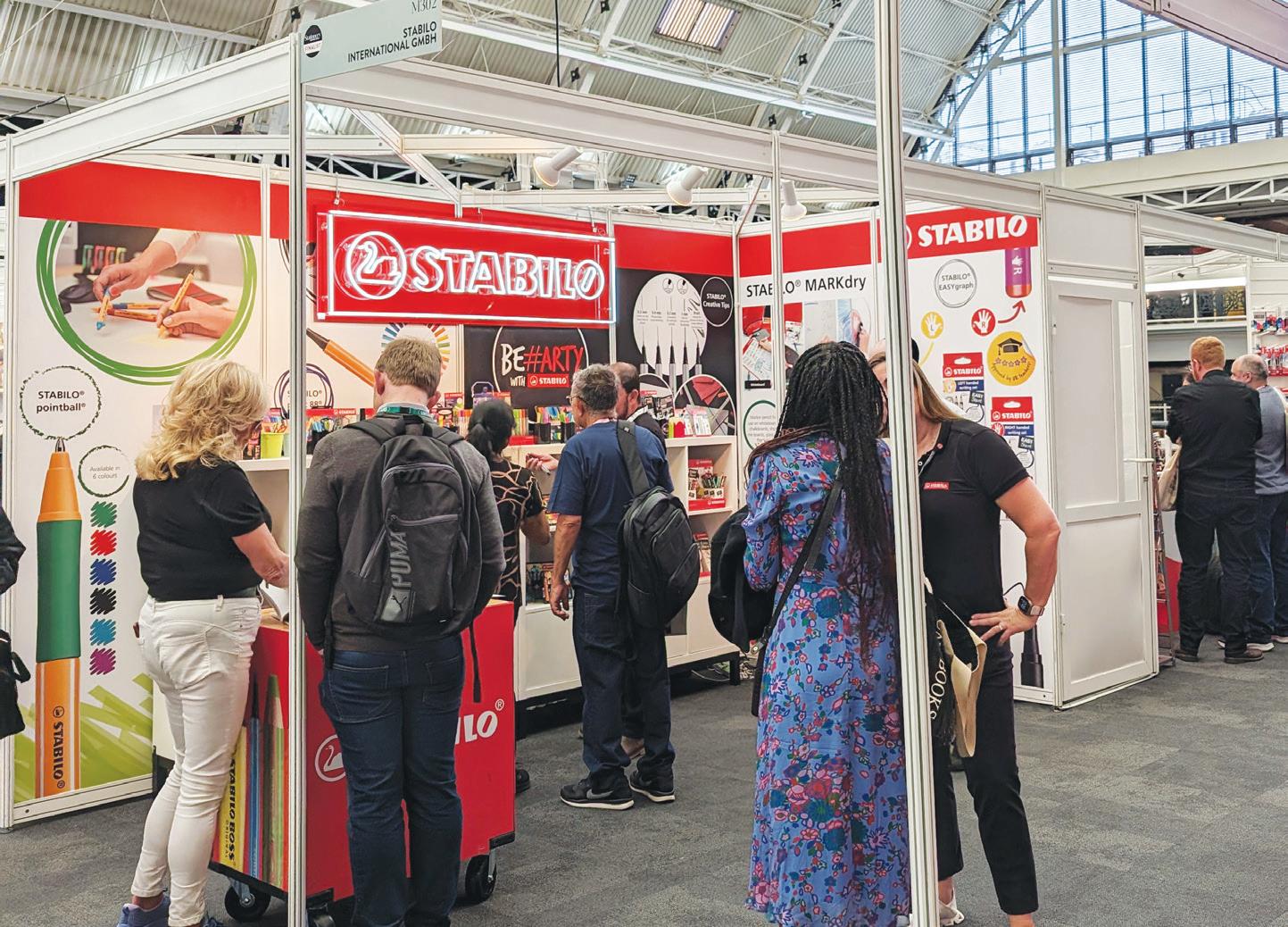
There was a great atmosphere at the Business Design Centre for the 12th outing of the London Stationery Show in mid-May. Find out more in Postitive vibes on page 36
business supplies and beyond
business supplies and beyond
Workplace360 c/o OPI, Focus House, Fairclough Hall, Halls Green, Hertfordshire SG4 7DP Tel: 020 7841 2950
Follow us online:
Website: workplace360.co.uk
Linkedin: workplace360.co.uk/linkedin
The carrier sheet is printed on Satimat Silk paper, which is produced on pulpmanufactured wood obtained from recognised responsible forests and at an FSC® certified mill. It is polywrapped in recyclable plastic that will biodegrade within six months.


EDITORIAL
Workplace360 Editor
Michelle Sturman 020 7841 2950
News Editor
Andy Braithwaite +33 4 32 62 71 07
Assistant Editor Kate Davies 020 7841 2950
OPI Editor Heike Dieckmann
What USP can you offer to customers if everyone else is also jumping on the bandwagon?
medical supplies and missed opportunities in technology. He astutely observes that while offices have become high-tech environments, dealers have largely overlooked this category.
In the education space, schools and colleges are investing in sixth-form areas, labs and sensory spaces – all of which need to be kitted out. Dive into these trends in Tech and tradition on page 38.
In the safety and workwear arena, consider sustainable clothing, smart PPE and garments and equipment designed specifically for women. Discover more in Safe as houses on page 30.
And let’s not forget workplace wellbeing. Turning up the heat on page 46 is all about the impact of menopause in the workplace. It’s a great way to incorporate plenty of products such as desk fans, air con units and water coolers into a wellness plan for customers to help menopausal employees. Feminine hygiene products also play a key role – which, incidentally, is mentioned by evo CEO Andrew Gale as one of the operator’s start-up categories last year in evo by the numbers on page 26.
Men’s health is on our radar too. P-Wave, a brand known for urinal products and air fresheners, has partnered with NHS England to raise awareness of urological cancers, promoting early detection through messages on urinal screens. Read more in Making waves on page 34.
Michelle Sturman, Editor
SALES & MARKETING
Head of Media Sales
Chris Turness 07872 684746
Chief Commercial Officer Jade Wilson 07369 232590
Commercial Development Manager Chris Armstrong
Digital
PRODUCTION & FINANCE
Head of Creative
Joel Mitchell
Finance & Operations
Kelly Hilleard
EVENTS
Events Manager
Lisa Haywood
PUBLISHERS
CEO
Steve Hilleard 07799 891000
Director Janet Bell 07771 658130
Executive Assistant Debbie Garrand
EDITOR’S NOTE
Marketing Manager Aurora Enghis
O O
No part of this magazine may be reproduced, copied, stored in an electronic retrieval system or transmitted save with written permission or in accordance with provision of the copyright designs and patents act of 1988. Stringent efforts have been made by Office Products International to ensure accuracy. However, due principally to the fact that data cannot always be verified, it is possible that some errors or omissions may occur. Office Products International cannot accept responsibility for such errors or omissions. Office Products International accepts no responsibility for comments made by contributing authors or interviewees that may offend. Workplace360
the UK by An
is printed in
OPI publication EMAIL US... To email any of the Workplace360 team, use the following: first name.surname@ workplace360.co.uk
3 WORKPLACE360 - JUNE 2024
looks at how cities around the world – including London – are adapting to the
ECI Software Solutions provides an update on its FusionPlus Eco Aware label initiative


look at evo’s latest financial results
Flashy Cactus Director
Jason Kinsey explains the company’s unique approach to sourcing specials
Urinal screens from P-Wave are helping the NHS in the fight against
industry doyen Mike Maggio offers UK dealers some sage advice
Exposed! Kristian Danielson from BIC
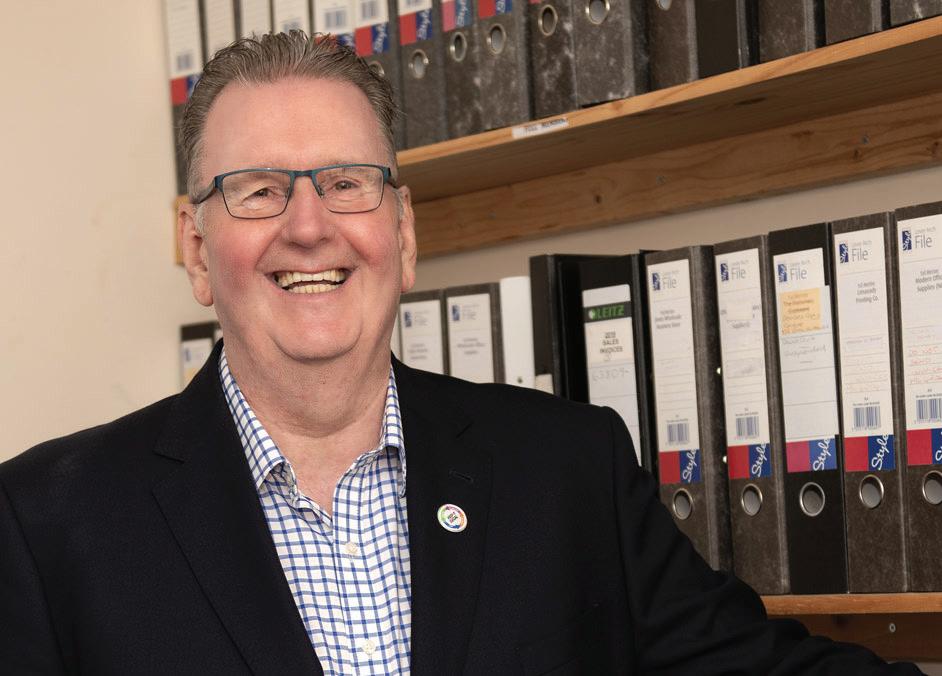



03 Editor’s note 06 News 10 Dealer spotlight Rewriting the rule book, ACS Group holds true to its core values of culture, customers and community 14 Research WORKTECH Academy
new
of working and living 24
ways
Sustainability
26 Talking point A
28 Interview
34 Advertorial
cancer 44 Interview
50
CONTENTS
US
JUNE 2024 16 46 Vicky Dymoke and Laura Wingate explain why dealing with the impact of menopause in the workplace is so important Despite budget constraints, there are still plenty of sales opportunities in the education sector 38 30 Sustainability and digital innovations are two areas currently driving the workwear and safety category Now under new management, the London Stationery Show offered a buzzy vibe 36 4 WORKPLACE360 - JUNE 2024
In conversation with... Nemo Office Club Managing Director Tim Beaumont
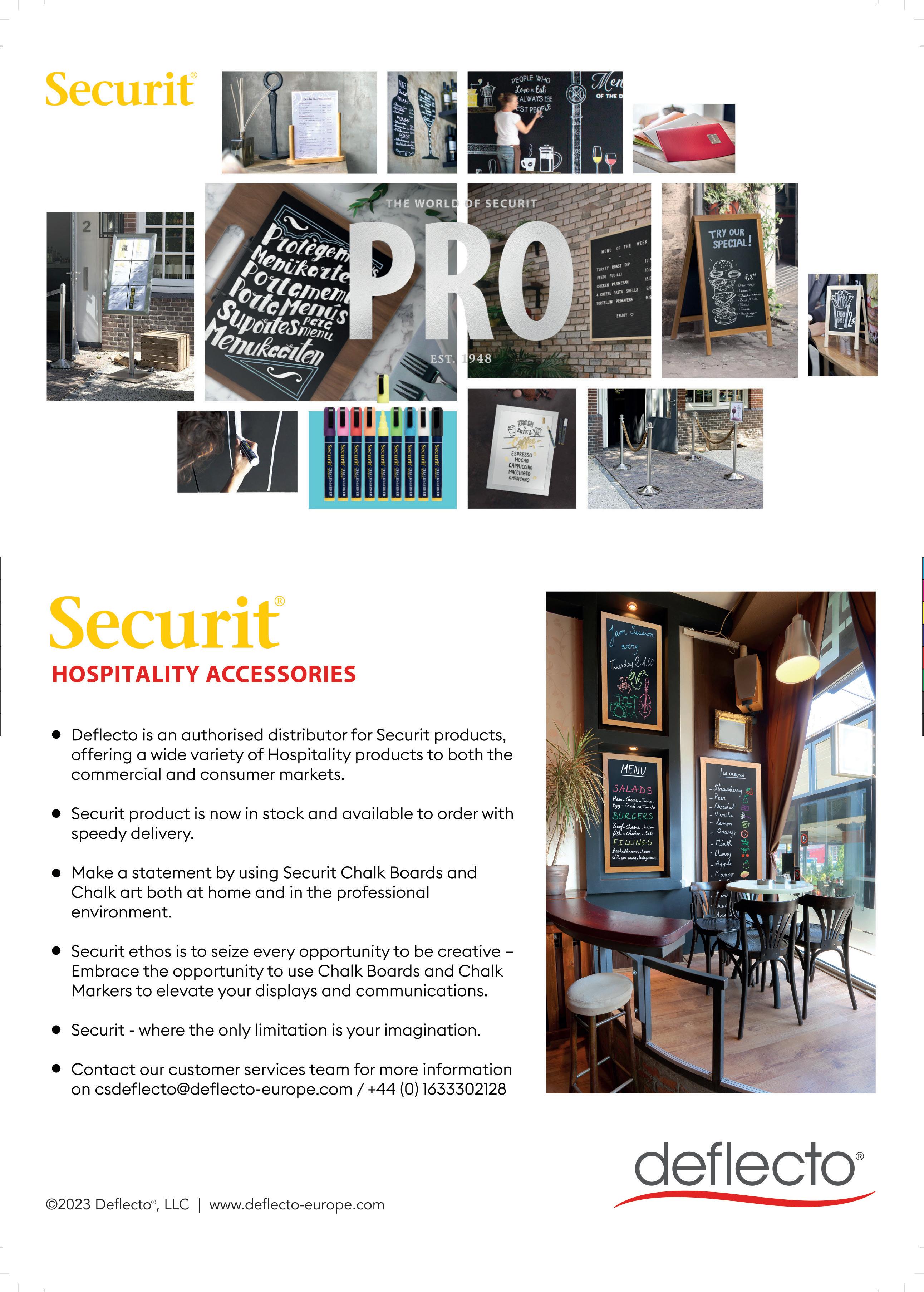
UK government names framework suppliers

Eight resellers, including four small businesses, have been awarded places on the UK government’s new Office Solutions framework. The Office Solutions contract (RM2699) was put out to tender last year. At the time, it was valued at £400 million over three years.
Originally to be split into three lots, the new framework – which replaces the previous Office
Supplies RM6059 agreement that expired at the beginning of April – has been awarded according to two multi-supplier lots. Lot 1 covers office stationery and EOS, including jan/san, foodservice, furniture and PPE; while Lot 2 comprises ink and toner products.
A total of eight suppliers were selected across the two lots as follows:
Lot 1:
l ACS
l Banner
l Bates
l Hyper Talent Solutions
l Lyreco
l OT Group
l Wildhearts
Lot 2:
l ACS
l Banner
l Bates
l Hyper Talent Solutions
l Lyreco
l OT Group
l XMA
The Crown Commercial Service – the entity that handles public procurement in the UK – said the inclusion of four SMEs on the agreement supports the government’s goal for £1 in every £3 to be spent with these types of businesses. The framework runs until the end of April 2027, but there is the possibility of a 12-month extension.
GOJO pulling out of Europe
GOJO Industries is closing down its operations in Europe. The maker of Purell hand sanitiser has decided to withdraw from the wider European market, including the UK and Ireland.
According to the most recent financial documents filed with Companies House (the 2022 accounts are four months overdue), GOJO Industries Europe (GIE) reported an operating loss in 2021 of £5.7 million. This came after revenue had dropped by almost 50% that year to £57 million following a stellar 2020 when COVID led to a surge in demand.

GOJO provided the following media statement to Workplace360: “Our GIE business has struggled financially for over a decade, requiring significant, ongoing support from the US throughout that time. As a result, a strategic review of GIE was initiated using outside experts to find a sustainable, long-term solution. Many options to turn around the business or to sell it were explored, but regrettably, no viable option could be found.
“Winding down our European operations was only done after making very extensive efforts to achieve financial viability in the region. For European business customers, part of the wind-down process includes continuing to produce products in France in the immediate term and making existing inventory available. GOJO Industries is also exploring other ways to minimise disruption.”
UK acquisition for Trodat
Trodat UK has announced the acquisition of independent rubber stamp manufacturer ASAP Stamps. ASAP – which describes itself as the “UK’s largest independent rubber stamp manufacturer” – has been supplying stationers and printers for 40 years.
The successful sale of the Sheffield-based company also marks the retirement of Managing Director Nigel Eyre. Trodat said: “ASAP’s proven track record for delivering excellent products and services, combined with its expertise in the office products industry, has made it a perfect partner.” Trodat
UK Managing Director Stuart Login called the acquisition a “significant milestone” for both companies.

NEWS
6 WORKPLACE360 - JUNE 2024
Fujifilm launches A3 line-up in UK
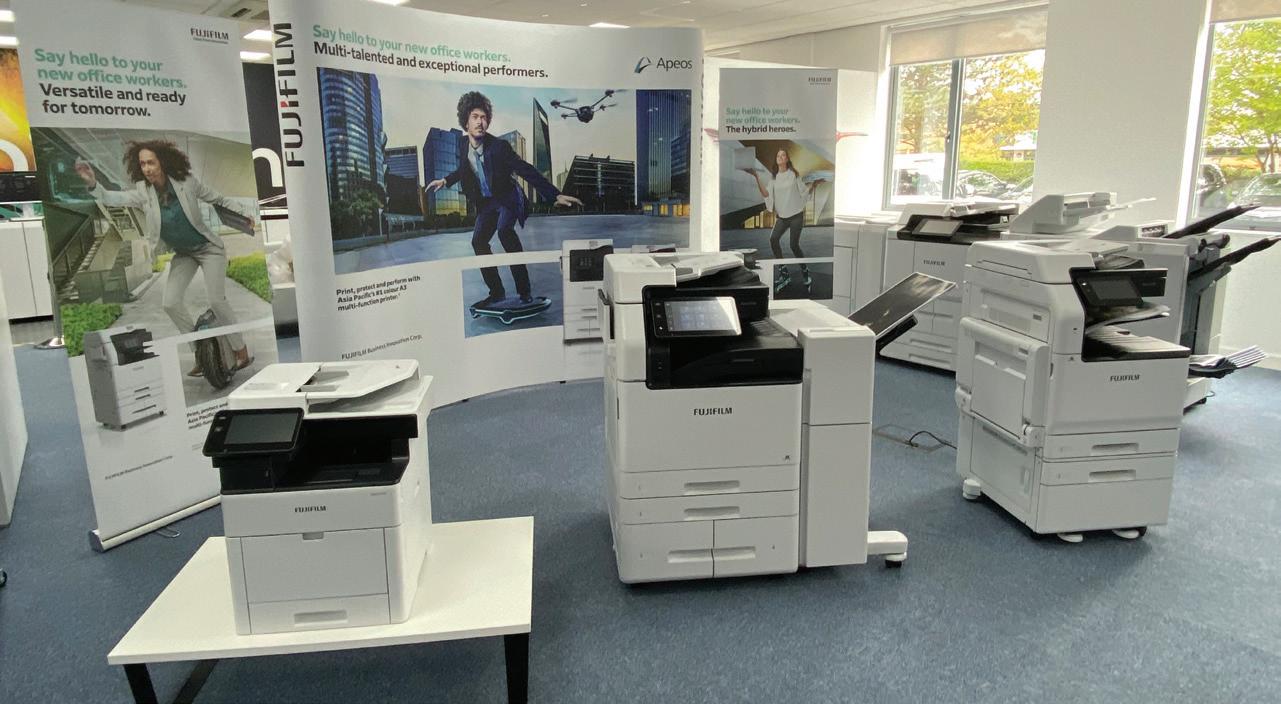
Fujifilm Business Innovation has announced the UK launch of its Apeos A3 multifunction printers (MFPs). Fujifilm is a leading brand in Asia-Pacific but has had little representation in the office MFP channel in other regions since the end of its joint venture with Xerox in 2021. Now, it is bringing Apeos products to the UK.
Fujifilm has partnered with business solutions provider Aurora for the initial launch of the Apeos series in the UK, with further expansion planned through a partner channel business model. Westcoast will handle the distribution of supplies.
Taku Ueno, SVP, Device Technology Division at Fujifilm Europe, said the company has enjoyed “huge success” in Europe since its entry into the toner production printer business in 2021. He called the launch of the firm’s office printers the “natural next step”.
VOW and Commercial agree new trading deal
VOW and leading reseller Commercial have announced that terms have been agreed on a new multi-year trading agreement. The companies said the deal represents a major commitment from both parties and marks the continuation of a trading relationship that has lasted more than 30 years.

VOW Managing Director Adrian Butler commented: “Commercial had several competing options and we are confident they have made the right choice in choosing to partner with VOW again. We do not take the loyalty of our customers for granted and believe we have a compelling proposition to help Commercial grow and develop its business over the next few years.”
Paul Nicholson, Commercial’s Group Sales Director, added: “As we build the foundations for our business to £100 million and beyond, it is critical we have the right partners supporting our growth ambitions. We conducted an extremely thorough review of warehousing and transportation providers across the UK and Ireland. Following this, and with the support of many people across Commercial, we conducted a detailed tender process.
“We are delighted that VOW stepped up to the challenge and is clearly able to provide the technology solutions and overall wrap-around services we require, providing the best value for ourselves and our clients.”

Drakeford steps down
Simon Drakeford is standing down as CEO of EO Group. Drakeford joined the business in 2007, succeeding founder George Karibian as CEO.
During his time at EO Group, Drakeford has been actively involved in helping develop and shape the business products industry, including serving as Chair of the BOSS Federation.
EO Group will now be jointly led by two experienced execs: CFO Nick Wilson and COO Richard Sinclair have been appointed as co-CEOs. Drakeford – still a shareholder in the business – is not stepping away entirely: he will stay on as a senior advisor.
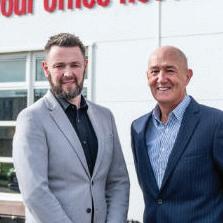
Langstane has confirmed that Mark Campbell will take over as Managing Director in June. The news is not a surprise. In January, current Managing Director Colin Campbell told Workplace360 he would be retiring after an incredible 50 years with the business, 37 of those leading the Scotland-based reseller.
Mark Campbell is the son of Colin’s cousin, Jack, and has already been with the organisation for more than 30 years. In that time, he has held several roles, most recently as the Director of the company’s Office Interiors division.

James Webb has joined the BOSS Business Supplies Charity as a trustee. He has worked in the industry for close to 30 years having joined Fellowes Brands in 1997.
Webb has held a number of UKbased and international roles and is currently VP Central Europe and European Marketing.
NEWS
MOVERS
SHAKERS
&
MD change at Langstane
New trustee for BOSS Charity
7 WORKPLACE360 - JUNE 2024
MOVERS & SHAKERS

Durable promotes Day
James Day has been named as Managing Director of Durable UK. Day has been with the OP vendor for almost six years and was most recently Sales and Marketing Director. He is on the committee of the BOSS Leaders of the Future initiative, was the 2023 winner of the Young Executive of the Year category at the European Office Products Awards and is one of the rising industry stars on OPI’s 40 Under 40 list.

Strategic
appointment at United
United UK has said the recent appointment of Finance Director Steve Johnson will contribute to its ambitious growth plans.
Johnson has extensive finance leadership and M&A experience at both private and private equitybacked firms.
Most recently, he was CFO at vehicle technology business Collision Management Systems, where he played a key role in its strategic repositioning and sale to US market leader Samba Safety.

Expanded role for Weedall
Martin Weedall has taken on extra responsibilities at OT Group’s (OTG) Spicers wholesaling arm. In addition to his role as OTG COO, Weedall is now leading all areas of Spicers that impact dealer customers. These include price, stock, service, operations, transport and customer experience.
Weedall joined OTG in 2022. Prior to that, he spent more than three decades at evo, where he held senior sales and operations positions across the VOW and Banner divisions.
Ambiente axes office supplies
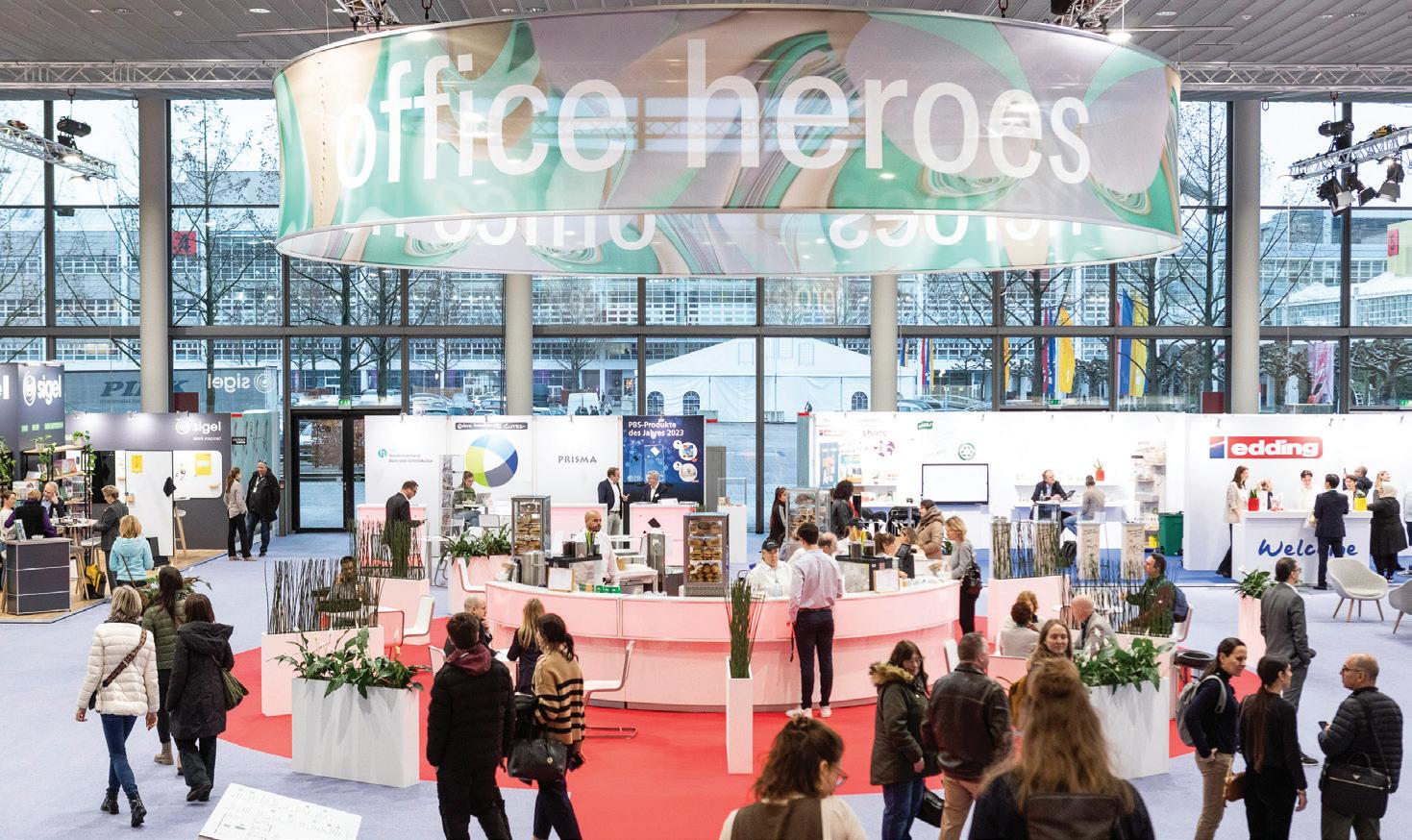
B2B office supplies will no longer be part of the Ambiente trade fair in Frankfurt. Instead, Messe Frankfurt announced that going forward, its commercial office products offering would be focused on the Paperworld Middle East event in Dubai.
“In Germany and Europe, this market has been stagnating for years, driven primarily by digital transformation. In response to new market requirements, manufacturers are increasingly expanding their B2B office product portfolio by adding B2C stationery offers or looking for new distribution channels and sales markets for their office products,” Messe Frankfurt stated.
As a result, suppliers that were previously housed in the Ambiente Working expo in Frankfurt will now be encouraged to exhibit in other halls, such as Creativeworld in Hall 1 and the stationery/back-to-school-themed Hall 4.2. The Future of Work area will remain in Hall 3.1, but this is aimed more at the contract furnishings segment that targets the likes of architects, planners and commercial end users. Ambiente Working will still exist as a concept but will focus on smart office solutions (such as room layout and acoustics) in Hall 3.1.
No reference was made to the Remanexpo aftermarket print supplies event at Ambiente, but Workplace360 understands this will still take place despite poor attendance levels this year.
Acquisition for Westcoast
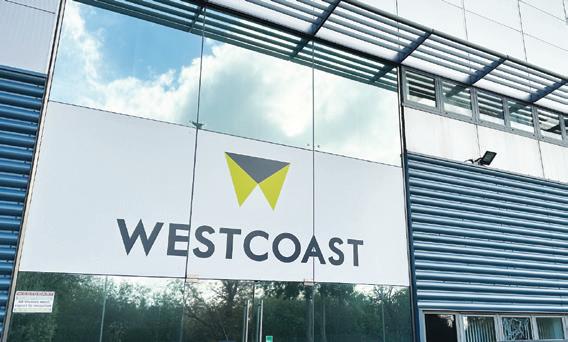
IT distributor Westcoast has confirmed the acquisition of components wholesaler Spire Technology. Based in the south of England, Spire reported sales of just over £103 million for the 12 months ended 30 April 2023 and traded with a gross profit margin of 6%. Founded in 1990, the company was majority owned by co-founder Victor Unt.
The deal for 100% of Spire’s share capital was completed in April and the business will now form part of the wider £4.7 billion Westcoast Group.
“There are so many benefits to the combination of Spire and Westcoast for both companies, vendors, UK resellers and employees,” said Westcoast Executive Director Alex Tatham.
“It will add significantly to Westcoast’s components portfolio. Spire will become the group’s main components pillar – with full access to all the customers, finance and tools that make Westcoast such a strong distributor in the UK and Europe.”
NEWS
8 WORKPLACE360 - JUNE 2024
Old Friends’ Spring Dinner welcomed The Stig
In April, the prestigious RAF Club in London hosted another memorable gathering of around 100 guests for the 2024 Spring Dinner organised by The Society of Old Friends.
The evening marked not only a celebration of camaraderie but also the inauguration of Workplace360 CEO Steve Hilleard as President of The Society of Old Friends. Meanwhile, Kelly Hilleard, Workplace360’s Operations and Finance Manager, is the organisation’s new Treasurer.
Founded in 1909, the networking group has honoured traditions while embracing modernity. This commitment to evolution was showcased as the President’s toast was written entirely by ChatGPT, highlighting the Society’s adoption of technological advancements and mirroring the dynamic nature of the industry it represents.

The highlight of the evening was welcoming former Formula 1 driver Perry McCarthy. Throughout the evening, he regaled attendees with tales of his battle to break into the world of professional motorsport and his time as the original secret
racing driver – The Stig – on the BBC’s long-running and popular Top Gear series.
McCarthy’s story is truly one-ofa-kind and had guests wide-eyed and eager to listen to the next uproarious adventure.
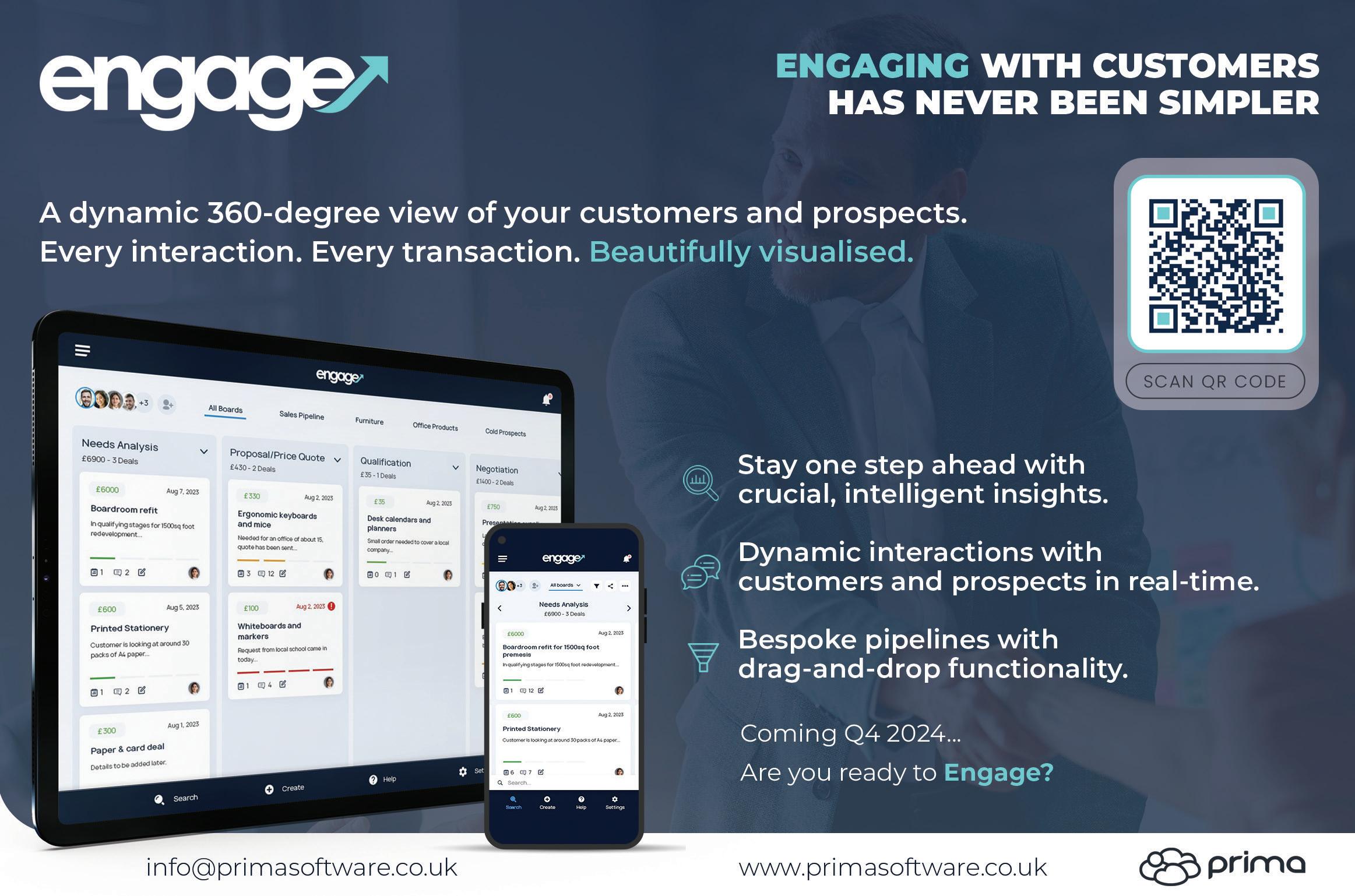
NEWS 9 WORKPLACE360 - JUNE 2024
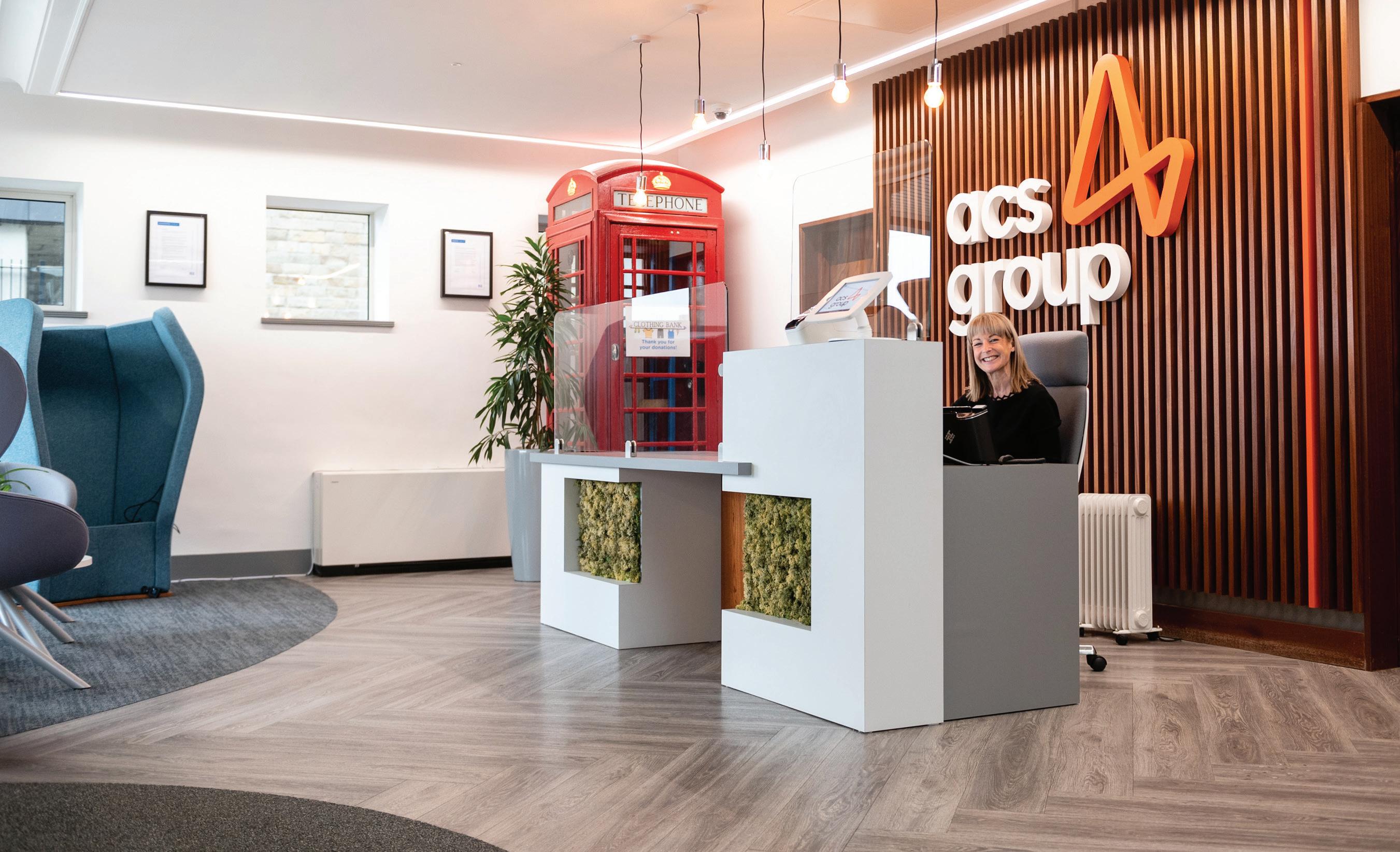
Supplying success
From start-up to industry leader, ACS Group rewrites the rulebook, blending innovation with a steadfast commitment to culture, customers and community
In 2008, amid the economic turmoil of the global financial crisis, a bold venture took form: Amalgamated Computer Supplies, now known as ACS Group. Co-founded by CEO Mike Hussain and supported by Commercial Director Harry Stevenson, who had previously worked together at ISA (now evo Group), ACS launched with a clear mission to ‘amalgamate’ diverse skill sets and deliver office essentials to the SME market.
Today, the ACS board comprises Stevenson and Hussain, with Martine Box as Group Sales Director and Sacha Jones as Sales Director. Reflecting on the company’s origins, Stevenson says: “Starting during the recession might seem counterintuitive to many, but for us, it was perfect timing.”
In its formative years, ACS adopted a telesales approach, targeting primarily the SME sector – a focus that has not only persisted but also expanded as the company has grown. From a modest start, ACS has grown to employ 115 staff members, adopting a people-first philosophy integral to its corporate culture
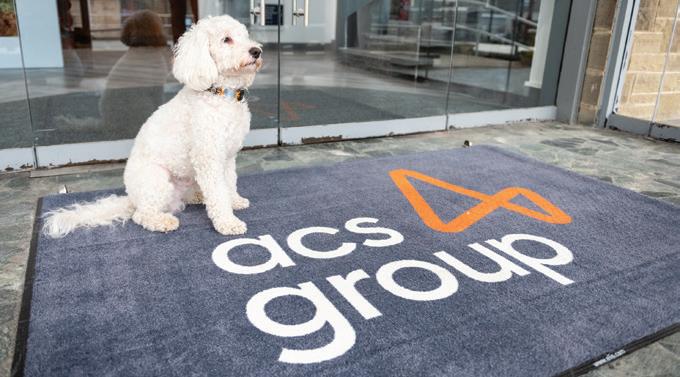
and instrumental to its success. Stevenson expresses pride in the team, stating: “Our people are the core of our business. Their commitment and the robust relationships they forge with customers are the key drivers of our growth.”
ACS is committed to employee wellbeing and professional development, which has promoted high staff retention rates and a motivated workforce and, in return, enhanced customer service and satisfaction.
Each year, the company conducts a Q4 promotion, rewarding team members with a trip of a lifetime prize alongside celebrating outstanding achievements with “old school” awards such as Employee of the Year and Salesperson of the Year, together with more contemporary awards recognising Young Professionals. Stevenson notes: “We consistently go above and beyond to ensure our staff feel valued, and I believe this sets us apart from others.”
A few years following its founding, a significant shift in ACS’s approach came after venturing into the public sector. Says Stevenson: “Securing contracts with
1 NO. OF DOGS IN THE OFFICE
115 NO. OF EMPLOYEES
DEALER SPOTLIGHT - ACS GROUP 10 WORKPLACE360 - JUNE 2024
major entities like the BBC was a turning point for us. It provided the confidence boost we needed, prompting us to invest further in our capabilities and broaden our range of offerings.”
The transition towards the public sector signified more than just a strategic move; it mirrored the company’s burgeoning ambition and operational prowess. Over the following decade, ACS not only expanded its array of services but also strategically diversified its operations.
The introduction of managed print services, IT solutions and interiors was a natural progression aimed at meeting the increasingly complex needs of its clients. “We’ve always viewed our role as more than just suppliers; we see ourselves as partners who amplify our customers’ business efficiency. Expanding our services was a direct response to fulfilling that mission,” Stevenson remarks.
DYNAMIC DEVELOPMENT
The company underwent a rebranding, becoming ACS Group and restructured operationally into distinct ACS divisions: Office, IT, Managed Print, Interiors and Print. Stevenson highlights the significance of this rebranding: “The shift to ACS Group was pivotal. It harmonised our name with the expansive breadth of our services and laid the groundwork for future expansion.”
This internal reorganisation allowed each business unit to focus on deepening its expertise while still benefiting from the synergies within the larger ACS ecosystem. “It’s almost as if we’ve acquired five smaller businesses under the ACS Group umbrella,” Stevenson explains. “Following heavy investments in each area and robust marketing efforts to showcase this expertise, clients now place greater confidence in ACS to provide solutions across these diverse categories. We didn’t have that before.”
Crucially, this strategic reorganisation provides ACS with a cross-selling platform, which will be vital in moving forward with its ambitious plans to double the size of the business from its 2023 sales of £34 million – within a five-year timeframe.
Stevenson views this goal as achievable, especially with recent developments: “We have secured a position on the new Office Solutions Crown Commercial Service framework, significantly broadening our public sector opportunities. This placement not only continues our engagements with the police and the DVSA but also opens doors to influential bodies such as the MOD, central government, HMRC and the Home Office. The potential these partnerships offer makes us very confident about doubling our business.”
To date, all of ACS’s growth has been organic. While this doesn’t preclude the possibility of acquisitions, any such moves would need to align with the company’s strategic vision and integrate smoothly with the existing restructuring efforts.
INNOVATIVE HORIZONS
ACS is proactively positioning itself to achieve its ambitious growth targets by not only customising its offerings but also leveraging advanced technologies like AI. As a forward-thinking company, ACS has fully embraced technology to enhance operational efficiency and workplace productivity. The reseller recognises the distinct advantages of AI and automation and is committed to significant investments in both areas.
Automation will be utilised to streamline repetitive tasks, thereby reducing the need for manual intervention. However, it’s the incorporation of AI that particularly excites the ACS team. Says Stevenson: “We’re planning to use AI to assist in making complex decisions, analysing data and predicting behaviours. This will enable us to tackle challenges and stay ahead of those tech advancements.”
We’ve always viewed our role as more than just suppliers; we see ourselves as partners
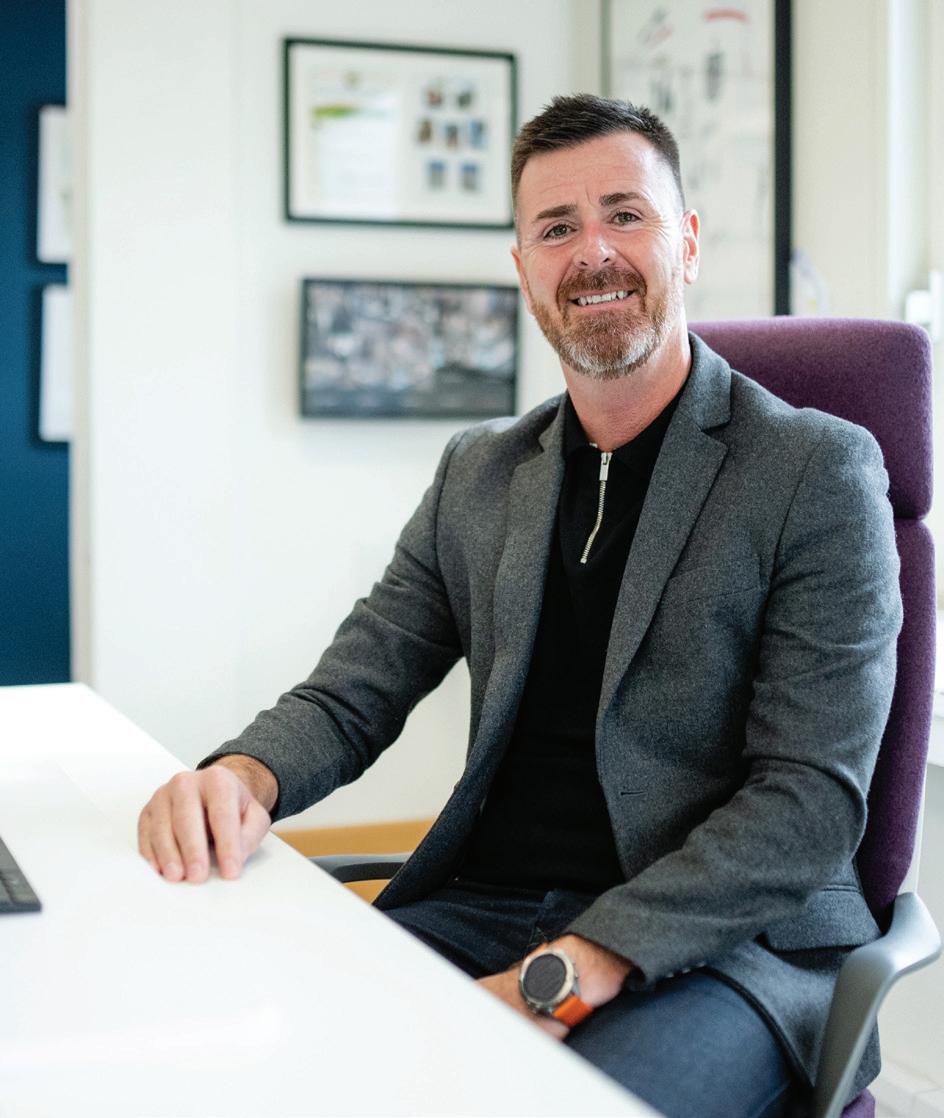
Harry Stevenson
DEALER SPOTLIGHT - ACS GROUP 5 NO. OF SUSTAINABILITY GOALS SET EACH YEAR
ACS Group Commercial Director
£34 million FY2023 SALES 11 WORKPLACE360 - JUNE 2024
ACS’s initial foray into leveraging AI includes the introduction of a chatbot designed to enable clients to retrieve invoices, track orders and more, without needing to directly contact customer service. While some relevant expertise was already available in-house, integrating AI technologies has been a significant learning curve for the team.
To address this, ACS has invested in a local education programme, resulting in two new team members specifically skilled in AI. This strategic move enhances the reseller’s current capabilities and also commits it to ongoing training. This ensures the team remains knowledgeable about the latest advancements and stays competitive in a rapidly evolving field. Stevenson adds: “As integral as this is, we are determined not to lose the personal approach that remains fundamental to our success.”
EMPOWERING GOALS
While technology will aid in operational efficiencies, ACS has demonstrated adaptability in navigating the optimal logistical and supply chain strategies to support its growth. Initially partnering with Spicers and later transitioning to VOW as its primary wholesaler, Stevenson notes that while the relationship with VOW has been “instrumental” to ACS’s business over more than a dozen years, the company maintains strong ties with both Spicers and Exertis Supplies.
Although primarily operating as a stockless entity, ACS does retain a substantial warehouse. Stevenson explains that this facility gives them the ability to offer customers an extra layer of service, from holding bespoke stock to offering a full consolidation solution. Despite having a warehouse, ACS differs from many resellers in that it does not own any delivery vehicles. The majority of orders are drop-shipped by wholesalers, while shipments from its warehouse are handled by courier services such as DPD.
Stevenson elaborates on this choice, noting that initiating in-house delivery logistics would go against

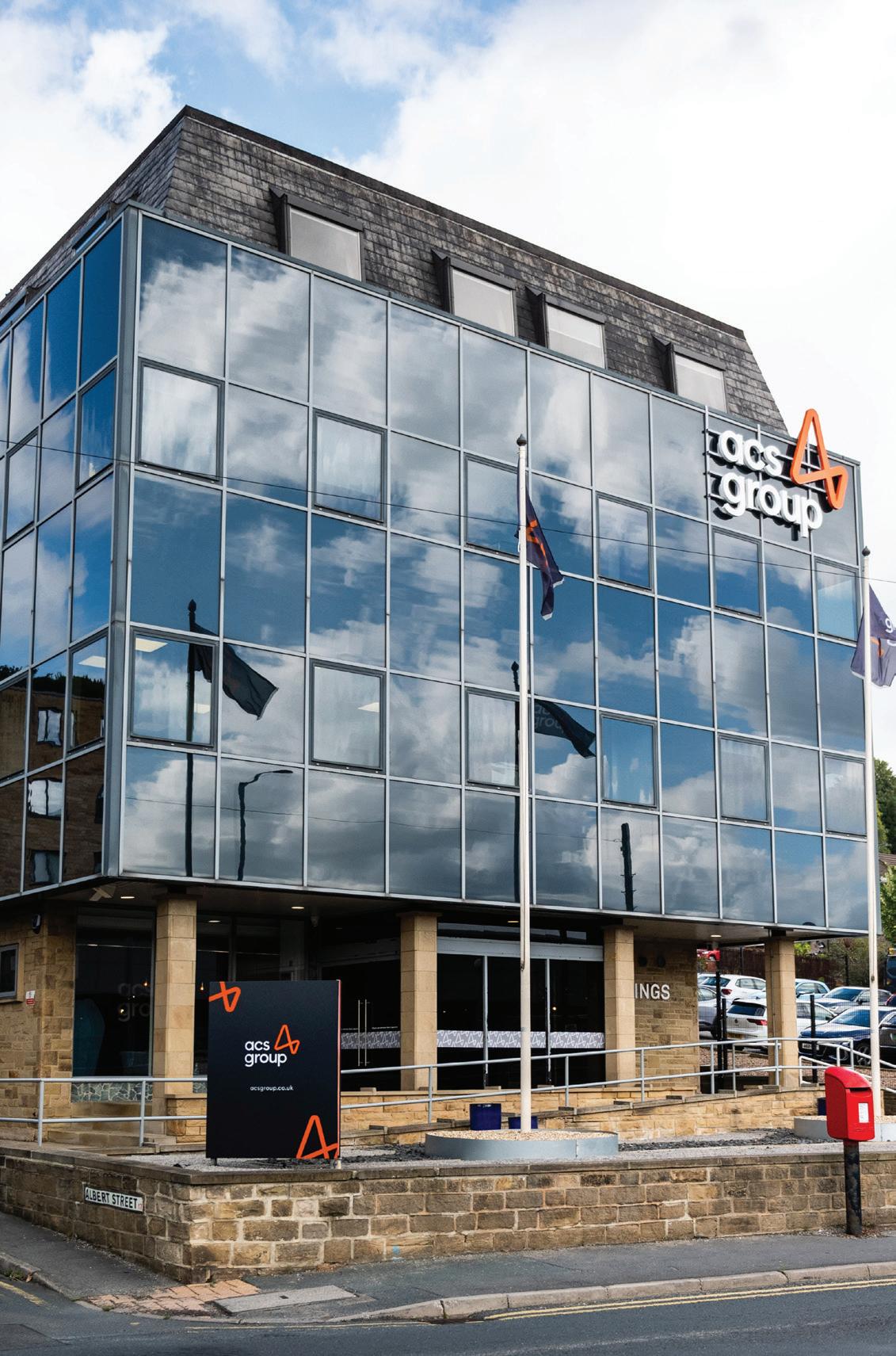
the company’s vision and strategy and, more crucially, would contradict its commitment to sustainability.
“Throughout our 16-year journey in business, we’ve consistently acknowledged our environmental responsibilities. However, in recent times, we’ve taken a significant stride by ingraining sustainability into our core business strategy,” he says.
Now firmly entrenched in ACS’s operational ethos, the company has undertaken substantial green initiatives. These include a shift to solar power and a commitment to adopting an all-electric company car policy by the upcoming year. The approach is straightforward and impactful and includes five sustainability goals set annually as well as incorporating updates into review packages for every customer.
Furthermore, ACS has forged a partnership with Nick Hollis, an adventurer, motivational speaker and life coach.
As the ACS Group Ambassador, Hollis will contribute his expertise to assist the company in reaching its net zero target and sustainability objectives, while ACS supports his ambitious 721 Challenge – which involves climbing the seven summits, skiing across the North and South Poles and rowing across the Atlantic Ocean.
ACS’s efforts have not gone unrecognised. The company won Reseller of the Year at the 2024 European Office Products Awards – a testament to its impact and commitment to excellence. “Entering was initially about raising our profile, but winning this award goes beyond just receiving a trophy,” reflects Stevenson, “it’s confirmation that our strategies and dedication to our clients and sustainability are on the right track.”
DEALER SPOTLIGHT - ACS GROUP
12 WORKPLACE360 - JUNE 2024
ACS Group Ambassador Nick Hollis
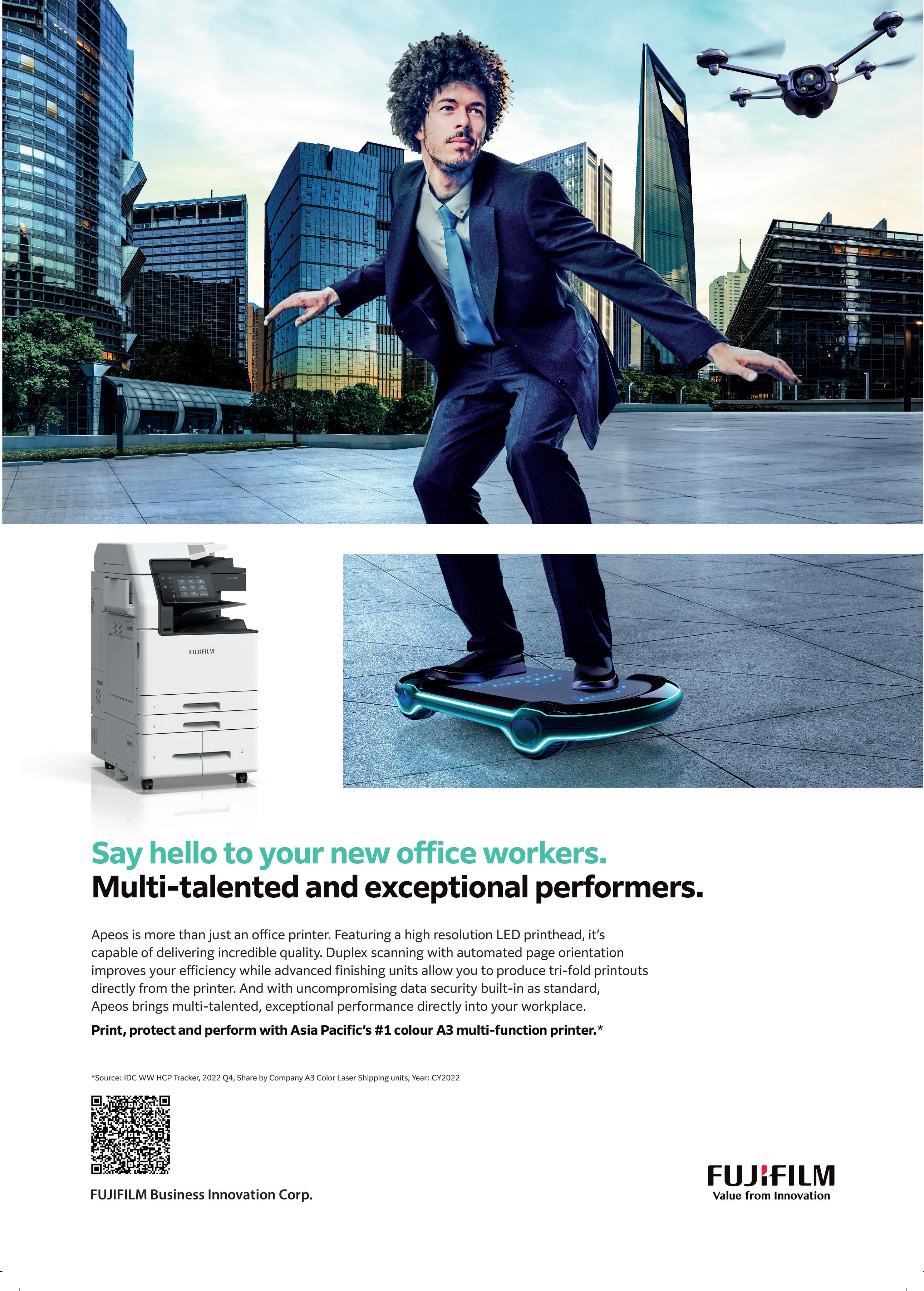


Skyline shifts
WORKTECH Academy research reveals how global cities are creatively adapting to the evolving demands of the modern workplace and urban living

WORKTECH Academy’s comprehensive Cities on the Frontline of the Future of Work: Trend Report Q1 2024 survey of six urban centres – New York, London, Sydney, Tokyo, Buenos Aires and Madrid – reveals significant trends reshaping the global real estate landscape, driven largely by the adoption of hybrid work models. These evolving work patterns are transforming city economies, altering public transport usage and redefining CBDs.
A notable swing is the ‘flight to quality,’ whereby corporations are shifting towards smaller, more sustainable office spaces with superior facilities. This migration is leaving behind a considerable amount of subprime office stock, leading to a geographic realignment of business districts and rental increases in prime locations.
Furthermore, there is a growing focus on the adaptive reuse of buildings and a concerted push towards sustainability. This is particularly evident in cities such as New York and London, where outdated buildings are undergoing essential upgrades to meet strict environmental standards.
Despite this, the popularity of tall towers and mixeduse developments remains high. A core issue for all the cities is the acute shortage of affordable housing, leading to various solutions being explored, such as converting office spaces into residential units and expanding buy-to-rent schemes.
URBAN TAPESTRY
While these are global real estate market trends, local nuances provide distinct contrasts. For instance, New York is seeing a decline in its coworking sector, whereas London’s flexible workplace market is flourishing.
RESEARCH - FUTURE OF CITIES
14 WORKPLACE360 - JUNE 2024
Tokyo is looking to address its ageing infrastructure and commuting culture, while political and economic instability has stalled progress in Buenos Aires. Sydney is preparing for extreme weather events, while Madrid is balancing its budding digital economy with a traditional preference for in-person communication.
Across all surveyed cities, hybrid working has become a mainstream element of workplace culture, impacting how people work and interact within urban centres. The move towards high-quality, environmentally friendly office spaces is ubiquitous, with an increasing emphasis on creating vibrant, walkable communities. Workplace360 takes a look at what’s happening in our capital city.
LONDON
The London office market is embracing a renewed sense of optimism as a burst in leasing activities, including substantial transactions by corporations such as HSBC, signalled a robust end to 2023. This was not merely a recovery but a vigorous close to the year, driven by both a spike in demand and a significant supply squeeze.
Expected declines in interest rates are anticipated to spur investment levels, while a resilient surge in office jobs fuels expectations of rent increases, especially combined with a scarcity of prime location offerings.
London’s famed bouncebackability from major disruptions such as Brexit and the pandemic is once again evident. A notable resurgence in construction activity is marked by the commencement of 5.1 million sq ft across 43 schemes – the most substantial since 2005, as highlighted in Deloitte’s latest Crane Survey.
A CRITICAL JUNCTURE
Despite these positives, the transition to hybrid working models is now deeply entrenched, conceivably more pronounced in London than in other European cities due to long and costly commutes. It is transforming the office landscape, with the flexible space market not only recovering but also expanding its share.
Interestingly, the main driver is in managed space for larger businesses. Coworking spaces are evolving to increasingly cater to those organisations seeking to manage a workforce effectively, with many corporate occupiers blending traditional leased spaces with highquality flex spaces.
Meanwhile, the demand for environmentally sustainable office spaces is transforming lower-grade assets and shaping the design of new buildings.

These developments are predominantly aimed at attracting small to medium-sized tenants from sectors such as technology. The City of London Corporation is responding by easing regulations to allow the conversion of older, under-utilised buildings into spaces for cultural, educational and hospitality purposes.
London’s famed bouncebackability from major disruptions such as Brexit and the pandemic is once again evident
Geographically, the office market is witnessing significant shifts, which are about not only offering space but also enriching the user experience, emphasising the importance of comprehensive amenities that enhance both work and leisure. Traditional business hubs such as Docklands and Canary Wharf are seeing major firms relocate, with burgeoning interest in the West End, locations west of the City as well as areas such as Waterloo due to their social amenities.
IN A PICKLE
Still, the city faces ongoing obstacles. London’s positive real estate outlook is tempered by the realities of high interest rates and limited space for new developments, compounded by an excess of outdated, less sustainable office structures. Moreover, London is grappling with societal issues such as a stark lack of affordable housing, rising wealth disparities and increased crime rates.
In addition, the pervasive adoption of hybrid working models might dilute the centralisation that is crucial for London’s high productivity in knowledge-intensive sectors, risking the traditional dynamics on which its economic success was founded. This factor could impact sectors that rely on in-person interactions, such as professional services and the creative industries.
While London faces many challenges, its office market is dynamically adapting, underpinned by a shift towards quality and flexibility. The city’s enduring appeal, bolstered by its cultural heritage and diverse sectors, continues to make it an attractive hub for a wide range of industries. This resilience and adaptability underscore its reputation as an ‘unstoppable city’.
To read the Cities on the Frontline of the Future of Work: Trend Report Q1 2024 and watch the accompanying webinars, visit www.worktechacademy.com.


RESEARCH - FUTURE OF CITIES
15 WORKPLACE360 - JUNE 2024
Pushing boundaries

Nemo Office Club Managing Director Tim Beaumont shares insider details on steering the cooperative through significant transformations, including the integration of Office Club and evolving market demands. He also gave Workplace360 CEO Steve Hilleard his candid views on the strategic shifts that are shaping the future of workplace supplies
IN CONVERSATION WITH - TIM BEAUMONT
16 WORKPLACE360 - JUNE 2024
W360: How did you end up in the wonderful world of workplace supplies?
TB: Amazingly, over 43 years of work life, I have had 30 different roles across four industries. Some were more exciting than others. In the late 1990s and early 2000s, I was involved in three tech start-ups with venture capital-backed offerings. I should clarify that I was the business lead rather than a technologist!
Following my last business venture, I worked for three years at SCC, a £3 billion turnover IT services firm, in a senior European marketing role. After some time not working and my wife insisting that I get a new job, I got the opportunity to join Nemo with a mandate to grow the organisation; and nearly 13 years later, I am still here.
W360: You’ve obviously found your home.
TB: I believe so, and given my age, this role might very well be my last stop. The tech stuff was really interesting, but Nemo Office Club is a completely different beast. I effectively work for the members, who are essentially my bosses.
W360: So it’s a cooperative owned by the members?
TB: Nemo has always functioned as a cooperative where each full member holds a share and has a say in how we run things. I’m accountable to a board of executives comprised of members and these positions rotate.
However, the acquisition of Office Club introduced a hybrid model. It brought in many new members who, unlike our full members, don’t hold equity shares or the same level of sway over business decisions. While they may not have the same voting rights as the full members, they still have a significant influence on the way the business is run.
W360: What did the group look like when you joined?
TB: When I joined, there were 48 full members. That year, although it wasn’t my initiative, we launched the Evolve membership – it was designed to serve as a pathway to full membership, although it hasn’t quite turned out as we envisioned.
Evolve members pay reduced fees and enjoy a subset of the full member benefits. Then, in July 2019, we expanded significantly by acquiring Office Club. We now have 264 members.
W360: How many of the 264 members are part of Office Club?
TB: 140 members are originally from Office Club, with around 80 being retailers. It brought about a massive change to our business model and was not without challenges. But we always believed the fit was right for the two groups, and I am pleased to say that has been the case.
W360: What is your largest member size?
TB: Total revenue, our largest members hit around £60 million, but workplace-related sales are only part of their offering. We have a number with revenues between £5-£8 million, but our sweet spot is dealers between £1-£2 million.
W360: What would you estimate is the combined revenue of the membership your group handles?
TB: This is an elusive figure for all dealer groups, as many of our members also sell a breadth of product we don’t help them with. Our estimate is £350-£400 million end-user sales. Our tracked purchases are over £40 million.
Nemo has always functioned as a cooperative where each full member holds a share and has a say in how we run things
W360: There still are several dealer groups in the UK. Yours is probably unique with the retail element, but what are its other USPs?
TB: Our key differentiator really lies in our focus on membership engagement and frequent support and contact with our members and vendor partners. Recently, we brought Anne Cooper, an industry veteran, on board from Nectere to enhance these efforts. She now manages a significant number of our smaller members, ensuring they receive regular –often weekly – interactions.
While some may point to networking or marketing as a USP – both of which we do really well – I believe that the true uniqueness of Nemo Office Club lies in the active participation of our members in shaping the direction of our business. They are genuinely involved. We have a motto that rings very true: “Together we are stronger”.
IN CONVERSATION WITH - TIM BEAUMONT 17 WORKPLACE360 - JUNE 2024
W360: How would you describe the past few years in terms of performance for your members?
TB: Retail has faced challenges, notably the reduction in footfall in town centres, but they’re very entrepreneurial and we’re now working with a lot of them to integrate more B2B aspects. Some are embracing online and we’re helping them to build a new business from the back of the shop, so to speak.
With many people now hybrid working, some have initiated local marketing efforts such as leaflet drops to attract business customers from their areas. We’ve also worked hard to boost footfall through our Keep It Local campaign. On the B2B front, there are those that are hungry and want to grow and take on new ideas and those that don’t. I think dealers have fared far better than expected.
A senior executive at Spicers predicted five years ago that there would only be 500 dealers by this time, and clearly, that’s not the case. There are still a lot out there and, perhaps surprisingly, new ones starting all the time.
It’s a bit arrogant to expect to go and eat someone else’s lunch without a tremendous amount of focus and effort
W360: Did you lose many through COVID?
TB: A few, but not as many as expected. The government furlough scheme was extremely generous, which helped many businesses stay afloat. Last year, although we lost 20 members, we also signed up 25 new ones, so we ended the year slightly ahead. In Q1 this year, we had already signed up five new members.
W360: Where are you picking those up from?
TB: Well, one has come from the Nectere demise and the others are just part of our persistent new business drive. The wholesalers tell us that they trade with c1,400 companies per month, but just how many of them are traditional dealers, we don’t know. We believe there are probably around 200-300 not in a group, and that is where we focus our efforts.
W360: Given the emphasis on diversification, what has the journey been like for your dealers?
TB: It’s a bit arrogant to expect to go and eat someone else’s lunch without a tremendous amount of focus and effort. Diversification requires commitment and additional resources.
Historically, dealers have relied heavily on the wholesalers, which perhaps has made them less inclined to venture out on their own. So, in my view, it has been much tougher than everybody thought. Plus, I don’t believe the broadline wholesalers have been that successful.
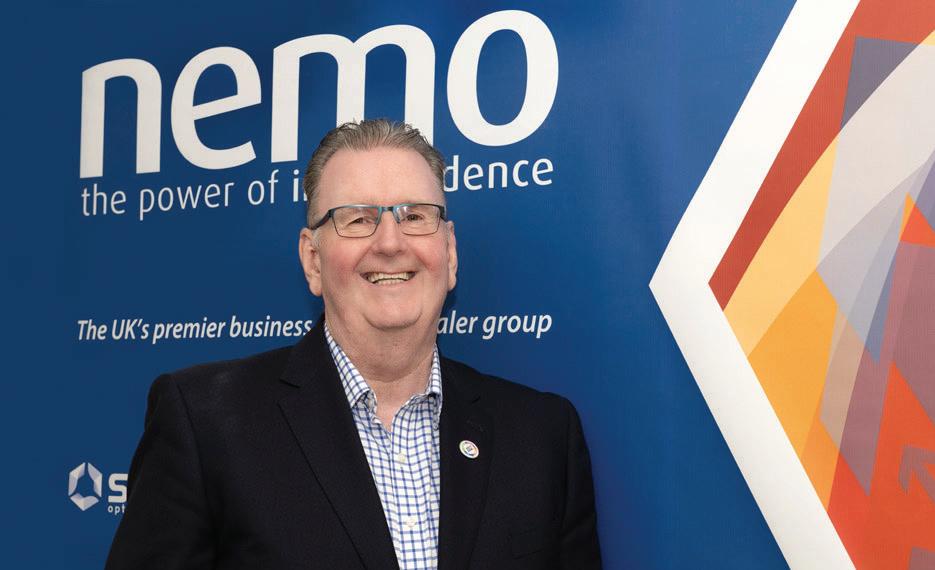
IN CONVERSATION WITH - TIM BEAUMONT 18 WORKPLACE360 - JUNE 2024

When I first came to this industry, wholesalers might have handled 70-80% of a dealer’s business, but this is no longer the case. Now, dealers are diversifying, sourcing product and exploring other suppliers to broaden their product offerings. Workwear – especially personalised workwear – is an area where we’ve seen significant interest and growth among our members.
Furniture is an interesting one. It experienced a lull during COVID but surged afterwards as companies revamped their office spaces, with furniture-led dealers doing really well. Our dealers have also seen new business growth in the medical, first aid and hygiene sectors, as well as some success in areas as diverse as tools and grounds maintenance.
W360: Technology must play a significant role in supporting those dealers who are successfully diversifying. How widespread is e-commerce adoption among your members?
TB: I think most of what we refer to as websites are actually customer portals. Most require a login and the pricing displayed isn’t particularly attractive. If dealers use it to interact with individual customers with their pricing, it’s not a website. Increasingly, I believe dealers need to offer visibility of pricing and an option to purchase for non-account visitors.
We’re offering a sort of hybrid model. However, there is still an insistence among many dealers that they would prefer not to have the orders online and instead talk to customers, with the option to upsell and maintain a personal touch.
For me, an online sale has many benefits, with lower cost of sale and non-negotiable price being two such examples.
W360: Customers probably want both options.
TB: In 1999, I was involved with an ad agency that went into what it called ‘new media’ and we were explaining the capabilities of websites. Fast forward to today and platforms such as Amazon have perfected the art of recommendations, ie ‘customers who bought this item also bought…’.
However, in our industry, I believe we are still a long way behind in terms of introducing recommendations and cross-selling on websites. Similarly, there is scope for increasing search functionality to make it easier for website visitors to self-serve better online.
W360: Maybe that’s where AI will come into play.
TB: I’m sure it will, yes. We’ve got a couple of big online players and it’s still challenging for them to get new customers. The cost of acquisition is becoming increasingly expensive, PPC is tough in an industry like ours and SEO takes a long time. Not every dealer is ready to dive in, so we’re moving incrementally in this direction.
Coming from a technology background, I find AI fascinating. We’ve started integrating AI tools, so our managed service for email marketing and social
media has drastically changed. These tools have transformed these services into highly personalised experiences with unique images and text specific to each dealer’s customer base.
W360: Let’s focus on dealer groups. Does it surprise you there are still five groups, excluding Office Power, Unity and those sorts of entities?
TB: Yes, it is surprising – especially when you look at trends globally, like in the US or Australia. You would think it is inevitable that consolidation will happen here too; having acquired Office Club, we are not averse to the idea of further conversations if it was right for all involved.
Why hasn’t it happened? I think there needs to be an appetite for it. There were challenges when we took on Office Club due to the different company cultures and approaches.
Ironically, the pandemic helped us bridge some of these gaps. We furloughed some staff, which left a core management team of five who met twice daily, and we started to get to know each other better and really bonded as a team and identified the key services and support needed across the diverse range of members. It changed the dynamics and we started to build one culture.
W360: A central issue must be the tangible benefits for the members in any potential consolidation.
TB: Precisely. The most important stakeholder has to be the members. I can see great benefits in the merger of certain groups, with the potential for significant buying power to approach wholesalers and suppliers with strong negotiating leverage. Consolidating two existing groups could pack a real punch in negotiation terms with the supply chain.
As previously mentioned, we are a cooperative owned by our members and at the end of each financial year, surplus funds – which in all of my time here have exceeded membership fees – are returned to the members. It’s why we exist: to make our members more profitable.
I believe in other groups, the surplus is held on to centrally. If we were to do that, our membership would quickly ask what the plans were for that cash.
W360: Having said all that, you’ve all come together recently as part of a BOSS Federation special interest group. What do you hope to achieve?
TB: There are benefits to collaboration. In my view, we need far more dealer involvement in BOSS to make it a more rounded organisation. As dealer group heads, we have all come together and are pretty open about the challenges – which are the same, unsurprisingly.
Although we haven’t established any concrete plans yet, it’s good to talk to everyone because we typically sit in our silos and don’t really get involved with each other because we’re competitors.
BPGI serves a similar purpose to some extent, as Nemo Office Club, Superstat and Integra Business Solutions are all members, so I do engage with them.
IN CONVERSATION WITH - TIM BEAUMONT 19 WORKPLACE360 - JUNE 2024
W360: Is BPGI still a relevant organisation? We don’t hear as much about it as we used to.
TB: It was a much bigger organisation when the US and Canada were involved. It now comprises 12 members with 16 supporting vendors. It has combined sales of €3.5 billion, 2,700 dealers and over 1.5 million end-user customers, so it is still a very significant outfit. We derive a lot of value from it and I get to spend time with those running businesses across Europe. I’m fascinated by the idiosyncrasies and challenges they face, which provide great insights we can use for the UK market. It’s an advantage when planning our marketing and strategies for our members, as we can engage with the research and activities of a much broader section of our industry.
From a manufacturer’s perspective, we all benefit from a joint Europe-wide marketing deal. Best practice sharing and engaging with peers at that level are huge value-adds for me and help reassure the vendors they are getting their products presented to end users in the way they know best generates sales. I think it’s still an exciting organisation.
W360: What are your thoughts on the changes from some vendors, such as moving towards direct-toconsumer models and launching their own websites?
TB: Vendors will always need the independent dealer channel, but they do have frustrations that the messaging they put out doesn’t always get to end users. To be fair, other parts of our channel embrace multichannel strategies and I can understand why vendors seek these opportunities.
However, they need to be careful not to help destroy us when they struggle to control pricing models with the likes of Amazon etc. Traditional OP is in decline and we all need to find new products and customers to survive and thrive. Some vendors only get the wholesalers to stock some of their product range, so presenting the whole list seems a good option.
W360: Are you surprised there hasn’t been more collaboration with cooperatives in other industries, such as cleaning, catering or workwear?
TB: It’s an interesting subject. We’re aligned with Network Group in the IT sector and both are part of Nexus – a coalition encompassing dealer groups from various industries with a similar ethos.
Network Group has evolved from hardware sales to becoming a managed services provider, which slightly broadens the gap between our operations. Despite this, we still collaborate on significant aspects. The services we provide to our members are very similar to theirs, so we could easily combine the two for mutual benefit.
I’ve also explored potential synergies with the building industry groups due to product crossovers we could sell to businesses. The groups in this industry are huge because every transaction goes through them.
W360: You mentioned the Keep It Local campaign earlier. Can you update us on its progress?
TB: It kicked off about three and a half years ago.
Other parts of our channel embrace multichannel strategies and I can understand why vendors seek these opportunities
The campaign originated when the government advocated for £1 in every £3 to be spent with small businesses and we felt sure that was not happening. Our members were certainly not getting their share of the pie, so we took that to heart, reaching out to figures such as Michael Gove and even then-Prime Minister Boris Johnson.
As expected, we did not get a response; but we used the dedicated website to encourage dealers and other businesses to contact their local MP for answers and to advocate their support for keeping it local – it definitely created noise, with great feedback from some MPs.
But Keep It Local has become so much more than that for our members – their proximity to their customer base and the fact that every pound spent locally generates wealth and circular economic benefits means this has really become the cornerstone of our marketing. We even use the umbrella brand to generate sales for our members in services such as EV charging, providing new prospects for their everyday consumables business.
Keep It Local aligns clearly with sustainability goals for businesses by promoting local trade and bringing many social and environmental benefits. We provide our members with the marketing tools to become the Keep It Local ambassador in their area, encouraging other companies in the community to get involved. These include a fully branded Keep It Local gazebo sponsored by key suppliers that members take to community and business events to promote their services and really shout the message.
W360: Let’s move on to the current state of the industry. I want to touch on Nectere first. What are your views on what unfolded there?
TB: The end part was terrible. I mean, no communication from the people who invested in the business. Who made that decision?
And then the way the staff were treated… Over 40 employees left to seek redundancy assistance from the government. From all the stories I hear, it was executed very poorly and some people should be ashamed of their behaviour.
W360: With the recent turbulence in the wholesale sector, what’s your view on this channel?
TB: Since I’ve been at Nemo, we’ve maintained a stance of being wholesaler-neutral, aiming to forge strong ties with all the major players – VOW, Spicers and Exertis Supplies – to ensure our members have

IN CONVERSATION WITH - TIM BEAUMONT 20 WORKPLACE360 - JUNE 2024
the best possible opportunities with the wholesaler that is right for them at the time. I firmly believe that competition is good for business and if we could have all three major wholesalers succeeding, that would keep each of them striving to outperform the others. That can only be good for our members and all independent dealers.
In recent years, VOW has been in a comfortably dominant position and should receive some credit for adjusting to survive where others have faltered. But in the long term, a lack of competition can lead to complacency and we do not want to see that. Our members need strong and reliable support from their main wholesaler.
Exertis Supplies shows great ambition with the recent move to an expanded warehouse but seems to have discovered that such a large-scale action rarely goes without its issues. While knocked back a couple of steps, I am confident it will more than bounce back and be a good option for dealers.
I would love to see Exertis expand its offering and become even more diverse, but it has a very defined model, which works well for it, and we maintain a very strong relationship.
As the first group to agree on a deal with the new-look Spicers, we also have a significant relationship with it. I remain hopeful it can overcome its challenges and become a serious player in the market once again.
I am pleased to see the wholesalers turning their focus back to what they do best – providing an excellent distribution service and letting the likes of Nemo Office Club provide the marketing support.
I must say, however, I was a little taken aback by the comments made by Andrew Gale in your recent interview [read In conversation with, March 2024, page 18]. I don’t think dealers are happy with evo’s acquisition of Complete. If you’re a dealer in a town where Complete made one of its acquisitions, by the law of the jungle, if it had gone bust, you would have gained some of that business.
The idea that that company was picked up by one of your own suppliers is a difficult pill to swallow. It is important that independent dealers feel that the industry is on their side and fighting for them.
W360: I don’t have insight into evo’s strategy, but I doubt they are actively looking to acquire resellers.
TB: One of the biggest challenges we face is dealing with members who come to us saying that they have come across VOW customers’ websites where they can buy tail products cheaper than their own cost price. There are already VOW-owned resellers out there. I have never come across an industry with such little pricing discipline and vastly fluctuating costs on individual items.
W360: With a decline in purchases from traditional wholesalers for most dealers, what kinds of relationships have you and your members formed with wholesalers in adjacent categories?
TB: We are working with our members to diversify their offerings and learn how to sell products that fall outside of their natural comfort zone.
We currently have 110 vendor partnerships that dealers can tap into, with these direct sales showing
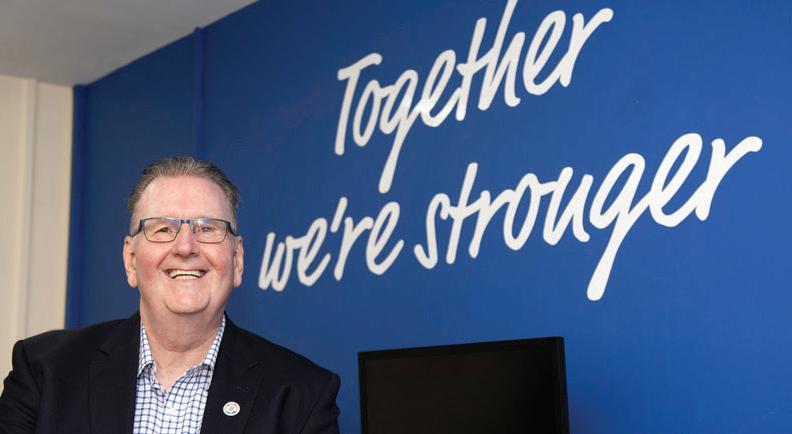
IN CONVERSATION WITH - TIM BEAUMONT 21 WORKPLACE360 - JUNE 2024
a 30-40% year-on-year increase. We have started working with a tools supplier (hardware, hand tools, power tools, etc), for example, and this has highlighted the challenges of entering new categories and obtaining the required data and pricing structure to introduce the range into a dealer’s offering. But it needs to happen to grow business away from traditional OP.
We also work with our supplier partners to get the message across about their full range, which often extends into categories beyond the top-selling lines featured by the wholesalers. Without a direct account with the likes of ACCO Brands, Beeswift or JGBM, to name just three, dealers can only access a fraction of the products available to sell.
We’re also increasingly focusing on services that generate ongoing revenue and customer loyalty, aiming to establish more sustainable income streams for our members such as print supply, charge point EV installations, drone hire and even cleaning contracts.
It’s not all doom and gloom. There is a future; and for those that diversify and win more customers, it should be rosy
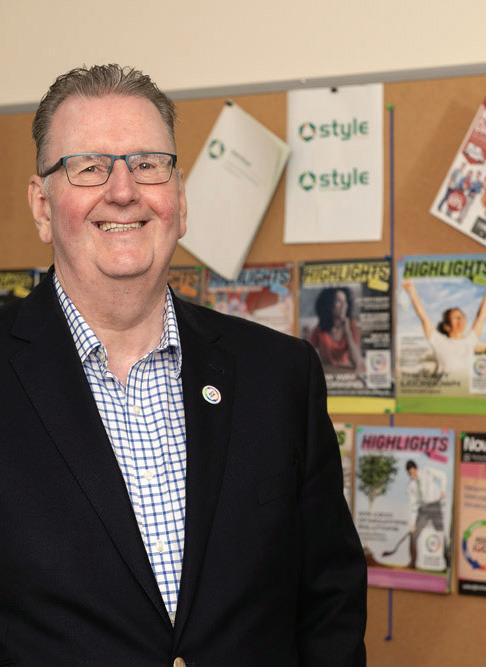
W360: Shifting to a couple of macro issues: how do your members approach sustainable purchasing in light of growing environmental concerns?
TB: We are very clear about helping our members achieve their sustainability goals where we can. We are not currently in the position where we offer a complete programme, but we have a ‘CSR Demystified’ scheme which takes the fear out of delving into the subject.
We assist members in creating and marketing their own CSR strategy. Our catalogue has evolved to clearly identify greener products and our purchasing team is collaborating with suppliers that can deliver an environmental benefit to our members and their customers. Working closely with the Durrell Wildlife Conservation Trust, we have our own brand copier paper that provides financial and awareness support for the organisation. It also helps members to integrate sustainability into their own strategy and take their first steps on the journey.
We have members much further down the road with carbon offsetting goals in place and sustainability accreditations and use these at the forefront of their offerings. These dealers are always willing to share their experiences and explain how to do the right thing.
W360: Addressing the perception of our industry as ‘male, pale and stale’, how can we better attract young talent starting their careers?
TB: Our organisation is pretty balanced, although I see attracting and retaining young talent as core and key. Outside of work, I actively engage in mentoring young professionals. I’m committed to it, but feel something has changed with young people in their attitude to work, work-life balance and company loyalty. The transient nature of their stay in our industry – often around two to three years, especially in roles such as marketing –presents a real challenge.
W360: To wrap up, what’s your perspective on where we’ll be five years from now?
TB: I’ve been very fortunate in my career to have had loads of exciting, challenging assignments. I may not be around at the helm of Nemo Office Club in five years, but I think the industry will adapt to the circumstances – although I don’t see any radical shifts in the model any time soon. No disrupter is about to launch, so I think we will continue as we are.
The independent dealer has incredible survival and entrepreneurial skills and I believe together, we will overcome the decline in traditional product sales and continue into the future.
Proactive members are still making money, although not like the good old days. They are very tenacious and adaptable, so I think the best will thrive. I am confident that Nemo Office Club will still be around, either on its own or as part of a supergroup.
We will find other products and services to sell, and I hope that new, young blood will come into our industry. It’s not all doom and gloom. There is a future; and for those that diversify and win more customers, it should be rosy.
IN CONVERSATION WITH - TIM BEAUMONT
22 WORKPLACE360 - JUNE 2024


Join us in the magnificent dining hall at King’s College, Cambridge, for a delightful evening filled with entertainment, delicious cuisine and exceptional networking opportunities SAVE THE DATE 26 March 2025 The BOSS Business Supplies Charity Centenary Celebration & Patrons’ Dinner A special celebration for a very special occasion

Workplace360 asked ECI for an update on its Eco Aware standards
An infusion of data
ECI Software Solutions’ FusionPlus software is considered critical infrastructure for many industries. It enables suppliers to empower dealers to sell more of their products by converting raw product data into enriched, fully attributed, e-commerce-ready content. This refined content is compatible with 95% of existing software platforms used by dealers.
FusionPlus continues to invest in and grow its offering by adding more supplier catalogues. As part of this effort, we’re working to provide dealers with more products that meet the new ‘Eco Aware’ standards. This initiative aims to equip the dealer community with a broader range of products with a degree of inherent sustainability, ensuring they can confidently purchase products and offer solutions that embody a commitment to environmental responsibility.
The FusionPlus database now includes over 44,000 products carrying the green Eco Aware designation. Our ongoing mission is to continue encouraging manufacturers to provide as much eco-friendly data as possible so it can be used to create a set of standard filters applicable to each product type.
GREEN BUYS
From a product point of view, vendors typically update their product data weekly, monthly, quarterly or on an ad-hoc basis as new information becomes available, ensuring that FusionPlus is up to date. However,
 James Stacey is FusionPlus Solution Consultant at ECI Software Solutions
James Stacey is FusionPlus Solution Consultant at ECI Software Solutions
assessing whether a new product meets the Eco Aware criteria can pose challenges. Some products may not be immediately recognisable as eco-friendly or might not naturally fit into the ‘green’ category, making it difficult to ascertain their environmental credentials.
Our ongoing mission is to continue encouraging manufacturers to provide as much eco-friendly data as possible
As customers increasingly look to tip the balance of their product purchases towards environmentally friendly offerings, it’s even more important to incorporate sustainability data wherever possible. Many are now making purchasing decisions based on the environmental impact of products, so providing comprehensive information can significantly influence their buying choices.
I am a member of the BOSS Environmental Forum, which provides businesses with trusted and accurate information. We evaluate eco-friendliness on a productby-product basis. Any product deemed to be ecofriendly will qualify for an Eco Aware label, which helps many customers decide which items will count towards their internal sustainability goals.
QUALITY QUEST
The Forum works closely with suppliers to establish consistent criteria for the Eco Aware designation. However, to reach the level of effectiveness we aspire to, the amount of information we receive about the environmental attributes of a product needs to improve.
SUSTAINABILITY - ECO AWARE
24 WORKPLACE360 - JUNE 2024
It’s important to recognise the great deal of progress already made. Currently, there are 35 criteria used to assess whether to grant a product Eco Aware status; and as our initiative gains traction, we expect this number to increase. While only a few of these criteria may apply to every product, it’s crucial to consider the diverse range of items we evaluate – everything from printer ink to mower attachments.
To enhance the meaningfulness of the Eco Aware label, considerably more detailed information is required. The data we currently receive is good, yet it remains insufficient for comprehensive assessments.
For example, to determine whether a product has eco-friendly attributes, we typically ask if it contains plastic and, if so, whether it is recyclable, already recycled or refillable. These aren’t especially difficult questions, but we often encounter gaps in the responses.
To enhance the meaningfulness of the Eco Aware label, considerably more detailed information is required
FusionPlus incorporates products ranging from paper clips to forklift trucks, each embodying a very different set of eco-friendly attributes that are searchable. When a website doesn’t facilitate easy searches for specific criteria, it can hinder end users from finding exactly what they need.
FUNNEL VISION
Ideally, dealers want a way to filter products based on very specific eco-friendly or Eco Aware criteria. It means we need to decide and define a consistent set of standards applicable across a wide range of products. To achieve this, FusionPlus is working with the BOSS Environmental Forum to establish these essential guidelines.
Such an endeavour requires careful consideration as dealers do not wish to include a sprawling list of random or irrelevant ecofilters on their webstores – it’s just not practical. Therefore, obtaining accurate information from manufacturers is imperative to meet customer demands effectively.
It is only by having the correct, comprehensive and most current product details that FusionPlus can provide useful filters that buyers can apply. This enables them to make well-informed choices about their purchases – considering not just a product’s functionality and applicability, but also its environmental credentials.
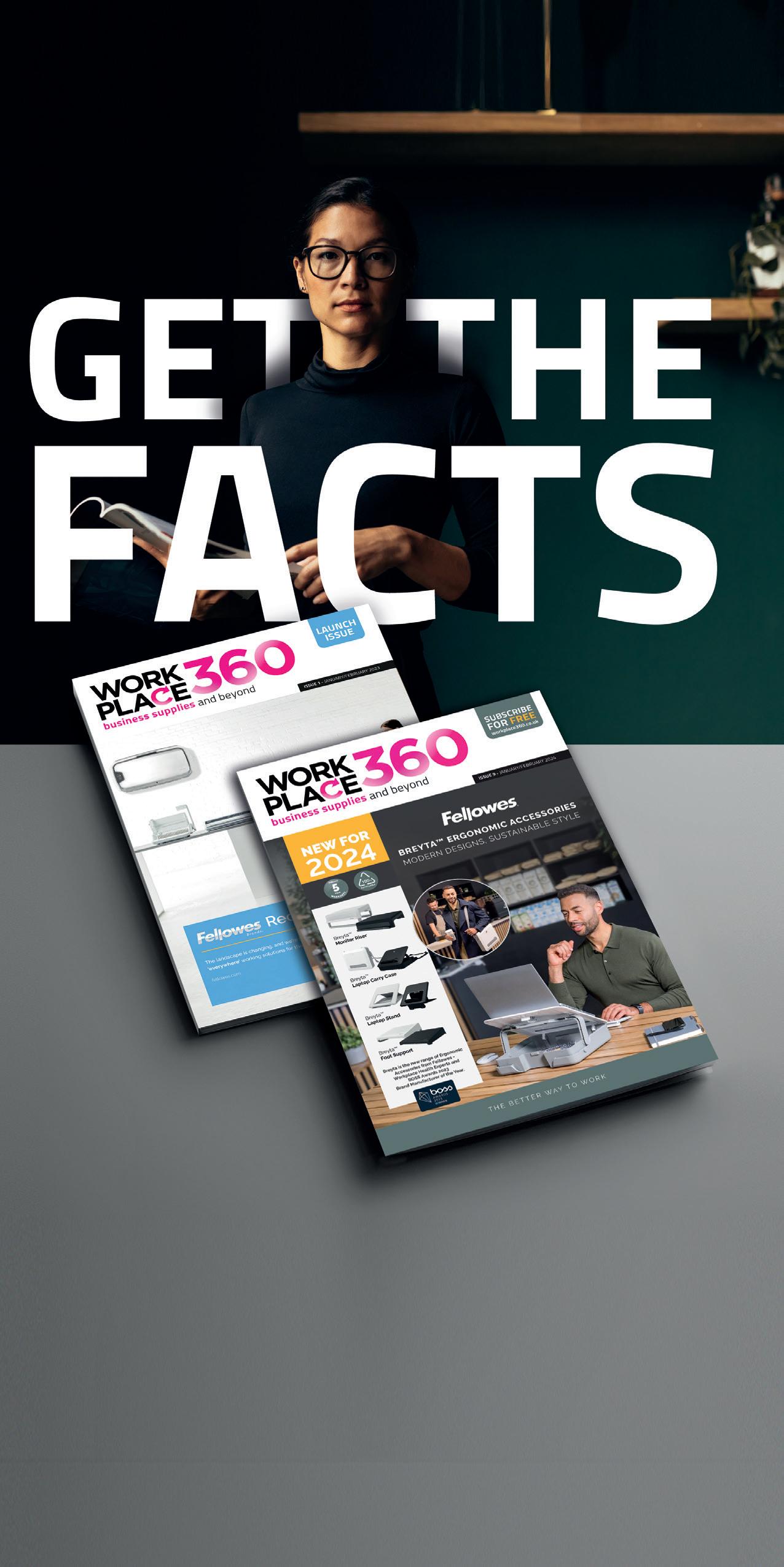
subscribe TODAY We don’t judge you for not wanting to share your copy of Workplace360. Get your colleagues to subscribe so they can have their own Workplace360 magazine – it’s FREE Visit workplace360.co.uk for more details and to subscribe for free 25 WORKPLACE360 - JUNE 2024
Since the second part of our interview with evo CEO Andrew Gale was published (read On stable ground, Workplace360 April/May 2024, page 20), the group and several of its individual subsidiaries have filed their 2023 accounts with Companies House. A chance, therefore, for us to circle back to Gale and get his take on evo’s progress – from a financial perspective – during his first full year as CEO.
Gale prefers to look forward rather than back, but – as he stated in evo’s strategic report – the 2023 accounts are “an important set of results for the group” and they clearly demonstrate the business is heading in the right direction.
Starting with the overall group results – which include the VOW, Banner, Complete, Premier Vanguard and Staples trading divisions – 2023 revenue was £505.1 million, up from £442 million in 2022. The increase was mainly driven by the addition of Complete, although higher demand and price increases at Banner and Premier Vanguard also had a positive impact on the top line.
As Gale notes, a key metric for a private equityowned business is EBITDA, and this is used as the main profit measure at evo. In 2023, the reported EBITDA was up by 50% to £15.1 million. This included a £3.5 million loss at Complete and results-driven bonus payments that were not made in 2022. Excluding these factors, underlying EBITDA was just over £20 million compared with £10.1 million in 2022.
An important factor behind the vastly improved bottom line was evo dealing with the impact of high cost inflation. “I understood our suppliers needed to pass through higher costs to us, but we, therefore, needed to pass those costs onto our customers,” says Gale. “However, for some of our channels, such as Banner,
evo by numbers
Workplace360 takes a look at the 2023 financials from evo and some of its key priorities for this year
that is harder to do than in others. We fell behind in 2022, but were able to catch up last year.”
He adds: “The job now is to keep up with inflation as we move forward.”
FILLING THE GAPS
The largest individual business in the evo portfolio remains VOW, with sales of £226 million and a much improved EBITDA of £10.4 million (£5.1 million in 2022), with better margins and lower operating costs driving the improvement. Stock fill rates were also up, growing from 92.9% in 2022 to 95.7% last year, very close to where Gale thinks the level should be. As he notes: “A 99% fill rate tells me we’re investing too much cash in inventory; if we’re sub 93%, the phones start ringing.”
The job now is to keep up with inflation as we move forward
Gale has learnt plenty from what and how Complete was buying and saw gaps in the VOW model which needed filling. Initiatives have included the introduction of a new 7,000-8,000-SKU workwear range in 2024 and the creation of a VOW Specials department that, in the first quarter of 2024, already surpassed VOW’s total specials sales for the whole of last year.
Banner is second in revenue terms and also had a good year in 2023. Sales were £179.1 million, a yearon-year increase of almost 5%, while EBITDA (before exceptional items) rose by 50% to £6.8 million.
In addition to the pricing measures already referenced, Banner took action to drive down its cost base during the year. Staff numbers were reduced by 15%, with the number of employees in 2023 standing at 404 versus 473 in the previous year.
Banner’s management report referred to “critically [reviewing] our resources in legacy areas”. Explaining

26
TALKING POINT - EVO RESULTS
WORKPLACE360 - JUNE 2024
this, Gale says he is willing to invest in categories across the sales channels that have positive growth prospects.
Today, these include areas such as facilities supplies, furniture, workwear, paper and feminine hygiene – the latter a start-up category in 2023 which is predicted to grow materially this year. On the flip side, segments that are expected to decline may require the headcount investment to be “revisited”. For the CEO, this ties in with a change of mindset (at group level) over the past couple of years regarding category diversification and resetting the business.
“Broadly speaking, it’s about providing anything an employer is prepared to pay for,” he states. “Whether it’s PPE, a lever arch file or a box of chocolates, we’ll do it –as long as a product fits our distribution model.”
Readers may be surprised to learn that, currently, only around 20% of evo’s sales are what would be classified as ‘traditional stationery’.
A GOOD BALANCE
The beginning of 2023, of course, saw the acquisition of Complete. While its numbers have not officially been filed yet, Gale told Workplace360 that approximately 80% of Complete’s revenue was retained. The purchase price was recovered through trade debtors and the sale of the opening stock. The cost to evo has been the – not unexpected – trading loss and exceptional items in the early months following the buying of the reseller.
Today, the business is on a stronger footing. A lot of integration and property rationalisation work has taken place over the past 12 months and is now almost finished. The company was on budget in March, and Gale expects it to be EBITDA positive this year.
It’s about providing anything an employer is prepared to pay for

“We made the right decision [acquiring Complete], but a lot of blood, sweat and tears have gone into rebuilding it,” he notes. “Taking a business out of administration and fixing it is never easy, especially when [competitors] are vying for its people and contracts.”
Gale believes Complete brings a better balance to evo’s direct operations. The same can be said of the Staples online business, which is set to be one focus area for the group this year. A longer-term licensing deal for the name has been struck with Staples in the US and evo will now look at tailoring the product offering more towards consumers, which make up about two-thirds of the Staples UK customer base.
Something else to look out for over the coming months is further acquisitions. Gale confirms there are several deals in the pipeline, and he is hopeful of getting them finalised before the year is out.
In the meantime, evo began 2024 with its best-ever month as a company, and now it’s very much a question of Gale and his team looking forward with a growing sense of confidence.

TALKING POINT - EVO RESULTS
evo CEO Andrew Gale
27 WORKPLACE360 - JUNE 2024
Workplace360 spoke to Jason Kinsey, founder and Director of Flashy Cactus about its fresh approach to sourcing product specials
A touch of flash
Workplace360: Before we talk about the business, can you tell me more about your career background?
Jason Kinsey: I grew up in Zimbabwe and in 2006, left the country and moved to Yorkshire, where I went straight into a sales executive role with an IT reseller. Afterwards, I joined ISA – now evo Group – as Specials Manager, followed by a two-year stint as a Product Manager at VOW. Jump forward around 15 years when I founded Flashy Cactus in 2021 and the rest is history.
W360: In a nutshell, explain what Flashy Cactus does.
JK: We offer the only specialist sourcing service for the business supplies trade. Dealers can – and do – speak to us about their weird and wonderful requests, usually involving products that are not available from their current suppliers. The team then takes the information, finds what they’re after and delivers most orders directly to the end user.
A valuable part of what we do is getting to know what our customers want and their key drivers. I am fortunate to have the ongoing support of Andrew Tsierkezou, co-founder of Bluesky T, who acts as a Flashy Cactus brand consultant and works directly with dealers to build lasting partnerships.
I’m very proud that we can almost always provide a clear and concise quote within 24 hours of the original request, along with estimated delivery times. Basically, Flashy Cactus is a sourcing specialist on steroids.
W360: That’s one way of defining your USP.
JK: Yes, it’s certainly unique. We’re also the only sourcing procurement business of its kind because we simply source specials, meaning the team is never distracted.
W360: What is your absolute priority when serving your customers?
JK: We must be a one-stop shop for dealers to find all the workplace products their customers are buying. This way, dealers can save time by not having to hunt around shopping online. We’re here to help dealers give their own clients exactly what they need to run a business. Additionally, instead of upfront costs, we offer a credit account with 30-day, end-of-month terms, so dealers can manage their costs more effectively.
W360: Moving on to challenges, have you or your customers faced any drawbacks?
JK: It goes without saying that the industry is constantly


evolving, and everyone has had to adapt. Wholesalers have had their problems and macroeconomic challenges have led to volatile dealer confidence. That said, the wholesale channel remains crucial to our industry and should be supported.
Dealers are crying out for access to more products, but managing more items comes with its own obstacles. That’s partly where we come in because they don’t need to work with hundreds more suppliers to sell thousands of additional products. Instead, they can leave it to us.
While I’m less familiar with manufacturers, I’m aware of the difficulties small businesses have encountered when trying to deal with them in the past. Ten years ago, everything had to go through wholesalers, but not anymore. Over the past three years, I’ve seen manufacturers becoming open to building relationships; we now have lots of direct accounts and are opening up new ones all the time.
W360: In difficult times, businesses can turn to price-centric selling, but you warn against it.
JK: The temptation to rely solely on price as a selling point can lead to negative consequences, from commoditisation and removing distinguishing features to undermining product value and brand image. We’ve seen our bigger customers rise to the challenge, selling on quality of service instead of product cost.
W360: And finally, do you offer any extra resources for dealers?
JK: Alongside our sourcing service, we offer free marketing assets and advice that can be downloaded at flashycactus.com.
INTERVIEW - JASON KINSEY
28 WORKPLACE360 - JUNE 2024
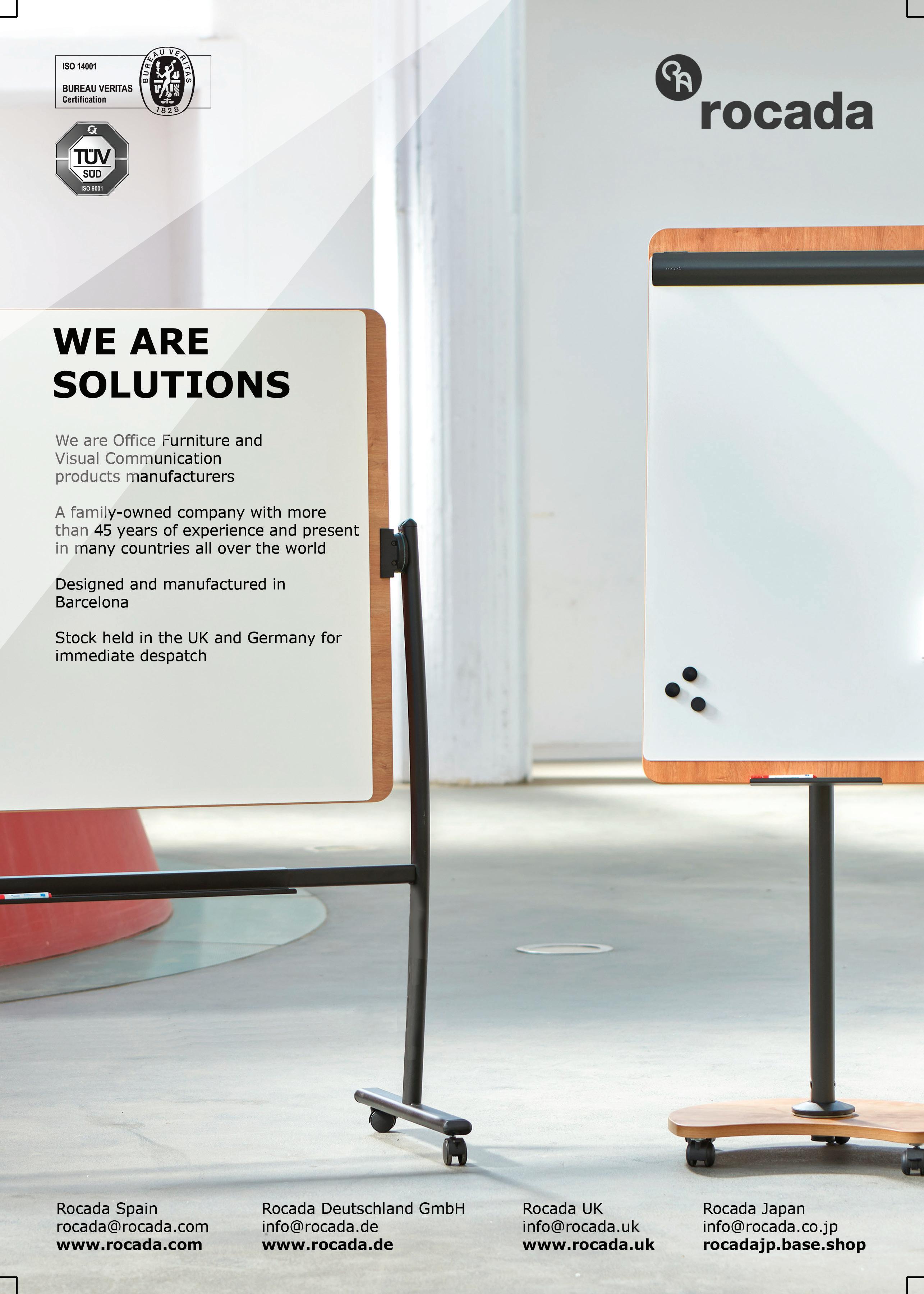
Safe as houses
The performance of the safety and workwear category has been mixed over the past year, but product development has many vendors enthusiastic about the future. By
Kate Davies
Players in the safety and workwear category have been treading water post-COVID. Following a surge in orders of safety equipment and PPE during the pandemic, the market experienced an influx of surplus stock between 2022 and 2023. Fast forward to 2024 and the increased focus on digital solutions and sustainability marks a step towards market growth for those open to modernisation.
One reseller that has made considerable progress in its goal to become a frontrunner in the safety category is Lyreco. The group’s Safety Business Director for the UK & Ireland, Helen Moran, says the brand evolution from Lyreco Safety to Lyreco Intersafe in April this year was a significant milestone for the UK and Ireland arm of the business.
She explains: “It isn’t merely a change in name. By merging Lyreco’s service excellence and sustainability
initiatives with Intersafe’s 90 years of safety expertise, we’re better equipped to cater to our customer requirements both locally and throughout Europe. Focusing on the UK and Ireland, we’ve solidified our position as a reputable contender in a mature market.”
Durable UK has also strengthened its place in the category, with its access control and signage product lines seeing steady growth over the past 12 months. Marketing Manager Aksela Kolodziejczyk feels positive that Durable UK’s offering reflects current trends, which she sees continuing for the next year.
Says Kolodziejczyk: “We have seen a 10% growth in our access control category. This increase is likely due to the resurgence of workplace activity and the focus on creating secure environments with better control over individuals entering and exiting premises. Extending our signage range with new snap frames has also amplified demand, resulting in production exceeding our initial six-month plan.”
ECONOMIC INFLUENCES
Following the challenges of COVID, the Russian invasion of Ukraine and the Israel-Hamas conflict, the UK has faced severe economic turmoil, with no signs of much relief. This has had a knock-on effect on public sector spending, with the fall into recession at the end of 2023 marking a particularly low point. In May 2024, the Institute for Government, a UK think tank, published a report warning that government spending for the upcoming year is shrouded in more uncertainty than has been seen in decades.
For example, the UK’s health and social care budget has steadily declined since 2021. Although the British Medical Association estimates that the NHS budget will break this pattern and grow by 0.2% in 2024/2025, it cautions that this increase won’t offset the problems posed by an ageing population, long waiting lists and past underspending.
According to Beeswift CEO Darren Washbourne, the PPE and workwear market is a function of the economy:

There are a lot of cheap and cheerful goods which aren’t fit for purpose
CATEGORY FOCUS - SAFETY AND WORKWEAR
of H&S professionals would pay a premium for sustainable products Source: RS Safety Solutions 2024 Health & Safety report 78% 30 WORKPLACE360 - JUNE 2024
“Central government infrastructure and construction spending plus local government budgets are key factors when predicting where the PPE and workwear category will be heading in the coming months and years. Trading across the sector was inconsistent in March for many businesses, highlighting local authority budgetary controls, although April was very encouraging – one of the upsides of the new fiscal year for authorities.”
Despite Washbourne’s concern, Advantia Managing Director Steve Carter says dealers have been concentrating on building sales in the safety, security and workwear sectors to offset the decline in traditional OP sales and the decision to shift focus seems justified.
RULES AND REGULATIONS
Director of Elite Office Supplies Eric Kerr believes specialist products for high-risk industries such as construction and railways are in high demand. But, he warns, in order to provide workwear to these sectors, it’s important dealers are risk-certified. He adds: “While there aren’t specific product areas to avoid, quality is crucial. There are a lot of cheap and cheerful goods which just aren’t fit for purpose.”
It’s essential when selling products in this category to ensure they have undergone extensive testing to fulfil their intended purposes. While obtaining product or business certifications may be time-consuming, they are imperative to safeguard the reputations of manufacturers and dealers, as well as potentially saving lives. “Investing in robust products minimises the risk of failure when they are needed most,” Durable’s Kolodziejczyk notes, “providing end users across diverse scenarios with peace of mind.”
During the pandemic, for example, the demand and scramble for PPE surged to unprecedented levels, leading to untested and unsafe products entering the market. Between 2022 and 2023, the British Safety Industry Federation (BSIF) analysed 123 non-member products and found that a staggering 79% did not meet the required testing criteria.

PROSPECTS FOR LITHIUM-ION BATTERIES
Due to the unique properties of lithium-ion batteries, which can store a large amount of energy in a very small space, they are now widely used in the UK. However, the London Fire Brigade warns they represent the fastest-growing fire risk in the city.
From handheld devices such as mobile phones to larger-scale applications such as electric vehicles and storage units, lithium-ion batteries come with inherent risks. Improper storage, unsafe charging practices or damage can lead to fires and even explosions.
Warning of the dangers, Phoenix Safes UK Sales Manager Leon Haigh says: “In 2023, lithium-ion battery fires were up 60%. You’ll no doubt have seen many news reports about the devastating impact they can have on property and lives.” As such, he notes, there is increasing pressure to see legislation regulate the application of lithium-ion batteries.
The EU has already implemented regulations governing the manufacture, transport and disposal of these batteries, which vary depending on their life cycle phase.
To help counter the risks, Phoenix Safes has developed storage safes which are “designed for domestic and commercial environments to safely store and charge lithium-ion batteries”.
As a member of the BSIF, Lyreco Intersafe works together with the organisation to address this issue. “Our ongoing efforts include reviewing products closely and raising awareness among end users about the importance of avoiding inferior and noncompliant products,” states Moran. “We encourage businesses to verify the companies they purchase from are members of the BSIF Registered Safety Supplier Scheme.”
Reassuringly, Washbourne has seen these products disappear since demand has fallen: “The core PPE and workwear market has returned to pre-
41% of businesses recycle PPE in-house
Source: RS Safety Solutions 2024 Health & Safety report

CATEGORY FOCUS - SAFETY AND WORKWEAR
31 WORKPLACE360 - JUNE 2024
COVID levels of sales with little evidence of the inferior non-conforming products that emerged during that period. Those organisations that popped up in the sector due to the opportunity and the concerning products that were entering the market are no longer visible.”
LOOKING AHEAD
As with many other categories – and indeed industries – sustainability continues to be a key focus in safety and workwear. Says Washbourne: “Of the 40 million workwear garments issued each year in the UK, 90% go to landfill or are incinerated. It’s critical the industry focuses on end of life and this is an area of strength for Beeswift, having developed Envirowear which is designed to be recycled.”
The Envirowear clothing collection launched last year following Beeswift’s collaboration with circular textiles firm Plan B (read Environmentally aware, Workplace360 March 2023, page 26). Today, the range is going from strength to strength as reducing waste grows in importance. Envirowear not only originates from post-customer waste but is also fully recyclable under a closed loop circular process, ensuring the products can avoid both landfill and incineration.
At Lyreco Intersafe, its laundering and recycling services have become increasingly popular as innovations centred on recycled content gain traction. Moran highlights that reusing materials to manufacture PPE enables customers to contribute to a circular economy, in addition to offering significant cost savings. Durable has expressed equal concern for
DEALER TIPS
• Build a close working relationship with a broad range of trusted suppliers.
• Look for specific safety features designed to enhance protection for users.
• Educate your sales team about safety and workwear to help them talk confidently about products. Take advantage of any training available from manufacturers and other experts.
• Lean on your dealer group, where you can find dealers that excel in the category.

waste management as environmental consciousness heightens. “We repurpose more than 80% of our plastic waste in our manufacturing process. Furthermore, 84% of our product packaging is fully recyclable,” Kolodziejczyk asserts.
With negotiations on the UN Plastic Treaty ongoing, plastic pollution remains a pressing global concern, prompting many manufacturers to seek sustainable alternatives. One manufacturer currently eyeing the UK market is The Original CleanBoot, which is seeking distributors for its reusable overshoes. OHSA-compliant, the company aims to replace disposable plastic and paper overshoes.
PRODUCT INNOVATION
Besides the possibilities of a circular economy, the use of smart technology in the safety and workwear category is also turning a few heads, particularly in the PPE market. The Smart Personal Protective Equipment Market by End-User, Product, Geography – Forecast and Analysis 2023-2027 by Technavio estimates market value to rise to almost $5 billion by 2027. While the report highlights that 39% of growth will originate in North America, it lists the UK as a key country contributing to the sector’s positive future.
Washbourne has also seen smart technology being applied to workwear but advises: “Product life and cost must be considered before widespread adoption. However, as with all tech-related goods, developments will drive down cost as volume growth takes place.”
Moran anticipates further developments in PPE converging with modern technology. For example, PPE manufacturers are starting to integrate NFC technology into their goods to facilitate maintenance checks and product tracking. She says: “Innovations in lone worker safety are emerging, including devices equipped with personalised SOS messaging and GPS tracking features.
“Additional services are available that connect users to alarm receiving centres for swift responses, bypassing traditional emergency call centres and ensuring rapid response.”
With locations across the globe, including the UK, manufacturer uvex has integrated wearable digital
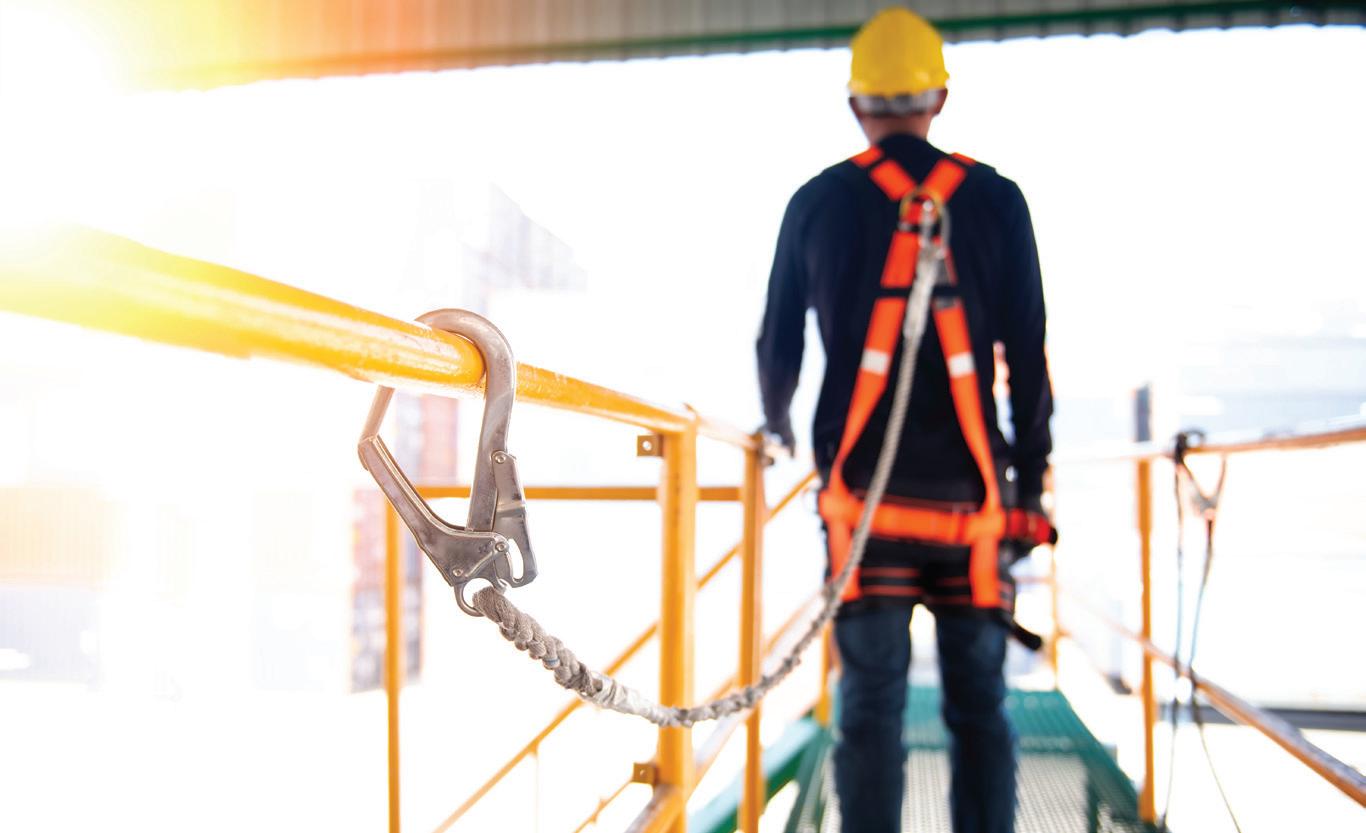
Wearing ill-fitting workwear reduces the functionality of its safety features CATEGORY FOCUS - SAFETY AND WORKWEAR 32 WORKPLACE360 - JUNE 2024
technologies to enhance the safety features of its PPE. Equipped with sensors, products including eye protection, helmets and safety shoes can react and communicate with the wearer according to the situation.
In the realm of hi-vis workwear, Kerr has observed a notable innovation. Manufacturer MiriCal Emblems introduced the Sun-Safe Indicator in 2023, ensuring that hi-vis clothing remains compliant with luminance and chromaticity standards. This patent-pending transfer can be seamlessly applied at any stage of the production process using a conventional heat seal. Explaining its importance, Kerr says: “When the hi-vis colouring begins to fade, the transfer will change colour, indicating that the garment is no longer compliant.”
Diversification is also key when developing product lines. RS, a wholesaler of industrial equipment, recently published its 2024 Health and Safety Report, drawing insights from 891 surveyed health and safety professionals across the UK and Ireland. Among the respondents, 82% emphasised the importance of enhancing PPE for women, advocating for better fit, sizes and suitability.
Traditionally, PPE and workwear have been designed for men, but Lyreco Intersafe believes customers are beginning to demand inclusivity. Says Moran: “Specialised ranges such as women’s fit, maternity and modesty options, as well as sizing that caters to diverse body types, have become increasingly popular – and rightly so.
“Wearing ill-fitting workwear reduces the functionality of its safety features and could also endanger the wearer further. We’re dedicated to protecting employees in the office, on the factory floor, and in any other working environment.”
DIGITAL ADVANCEMENTS
Alongside product development, digital advancements have had a noticeable effect on ordering experiences. According to Moran, there has been a clear shift towards e-commerce, complemented by the availability of expert advice when required: “In 2023, Lyreco Intersafe in the UK and Ireland took the lead in developing and launching a safety platform, empowering customers to access
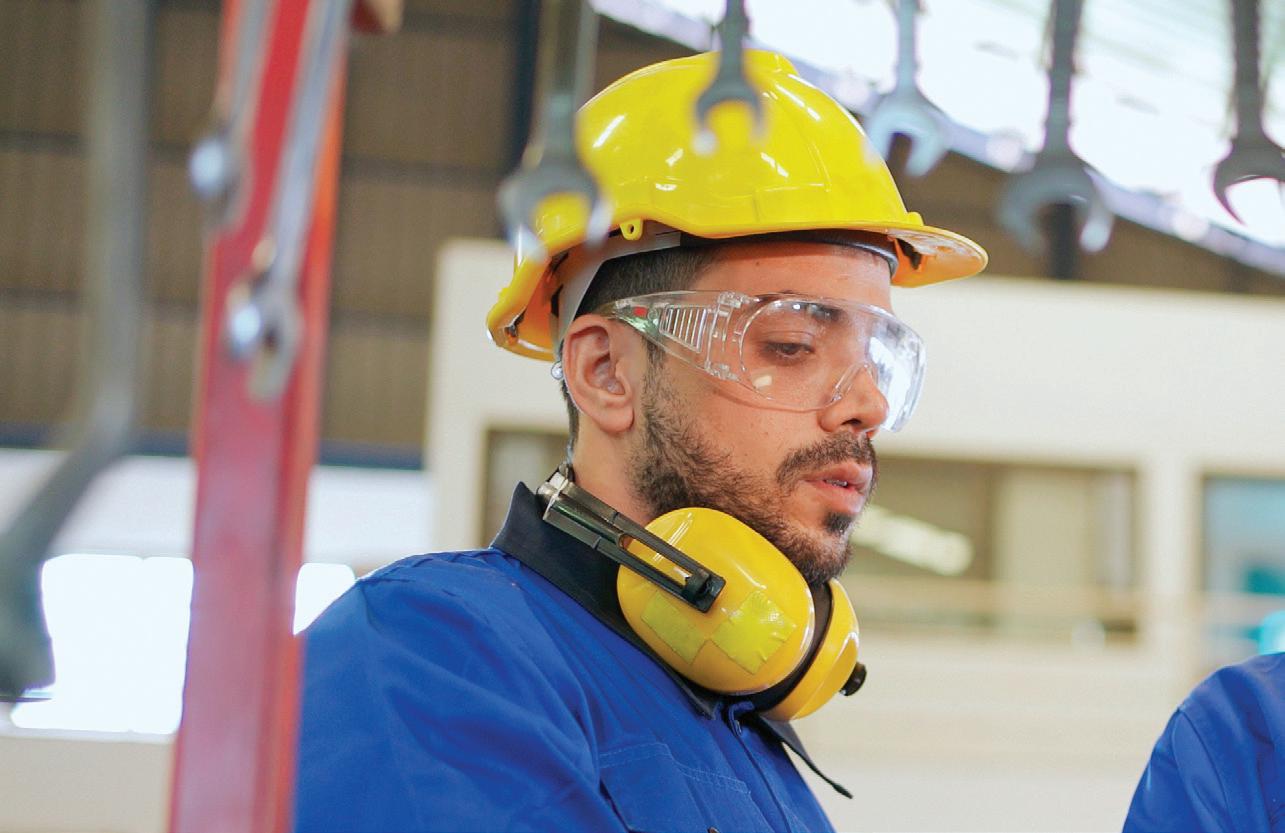
market insights and comprehensive product knowledge remotely, covering a wide range of safety needs. End users increasingly seek a consultative and value-added approach beyond competitive pricing.
Hybrid working has also driven the push towards digitalisation. Customers are increasingly leaning towards quick deliveries, emphasising the importance of maintaining stock availability.
Says Moran: “Lyreco Intersafe has responded by boosting our stock holding on safety products, strengthening our supply chain and expanding the range of items available for next-day delivery.”
Whether it be creating digital platforms for improved customer experience, redesigning workwear to accommodate everyone, or embracing the circular economy, it’s clear that the sector is shifting in response to changing customer and market demands. Admittedly, there are still some significant challenges in the UK, but vendors appear positive about the outlook.
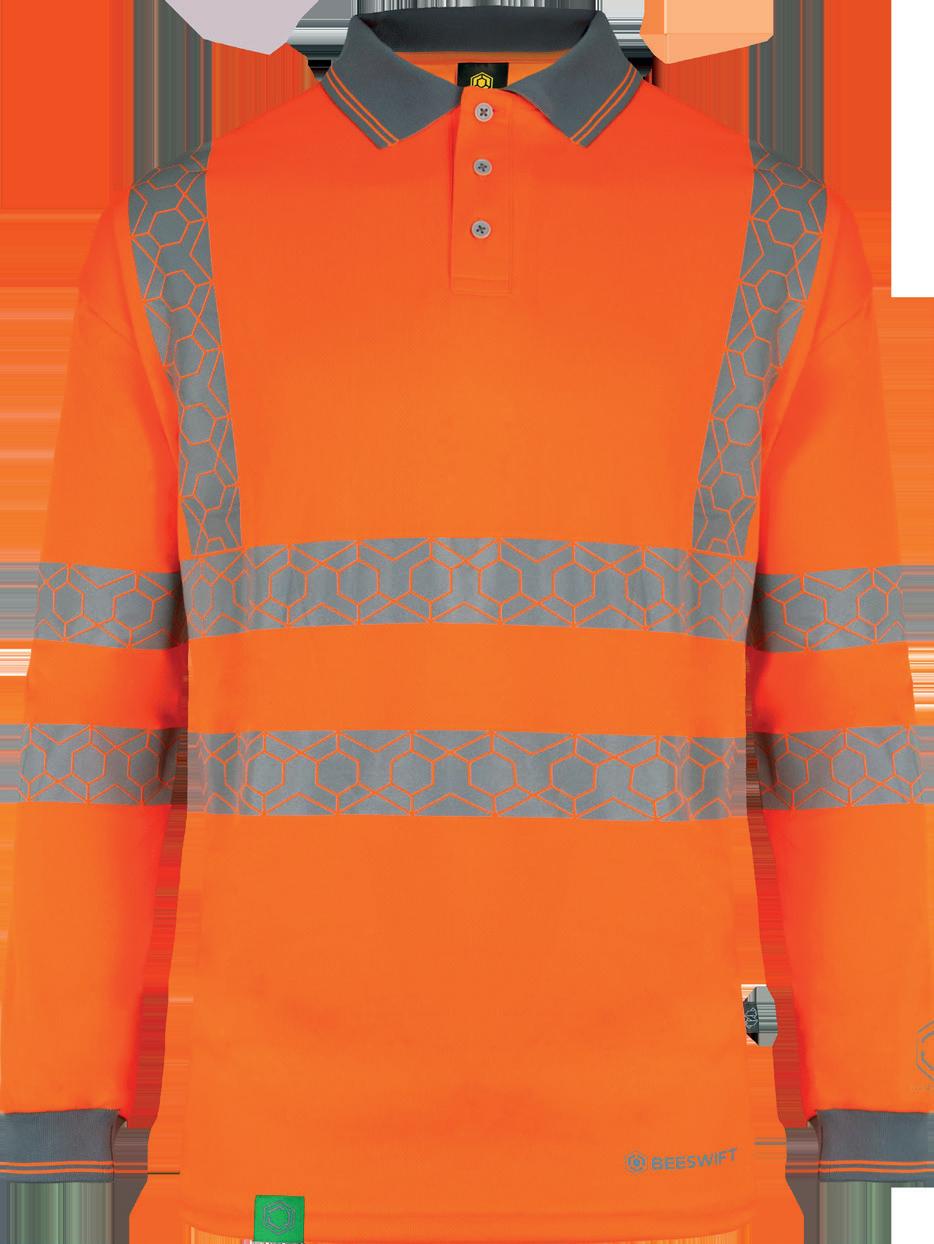
Innovations in lone worker safety are emerging, including devices equipped with personalised SOS messaging and GPS tracking features
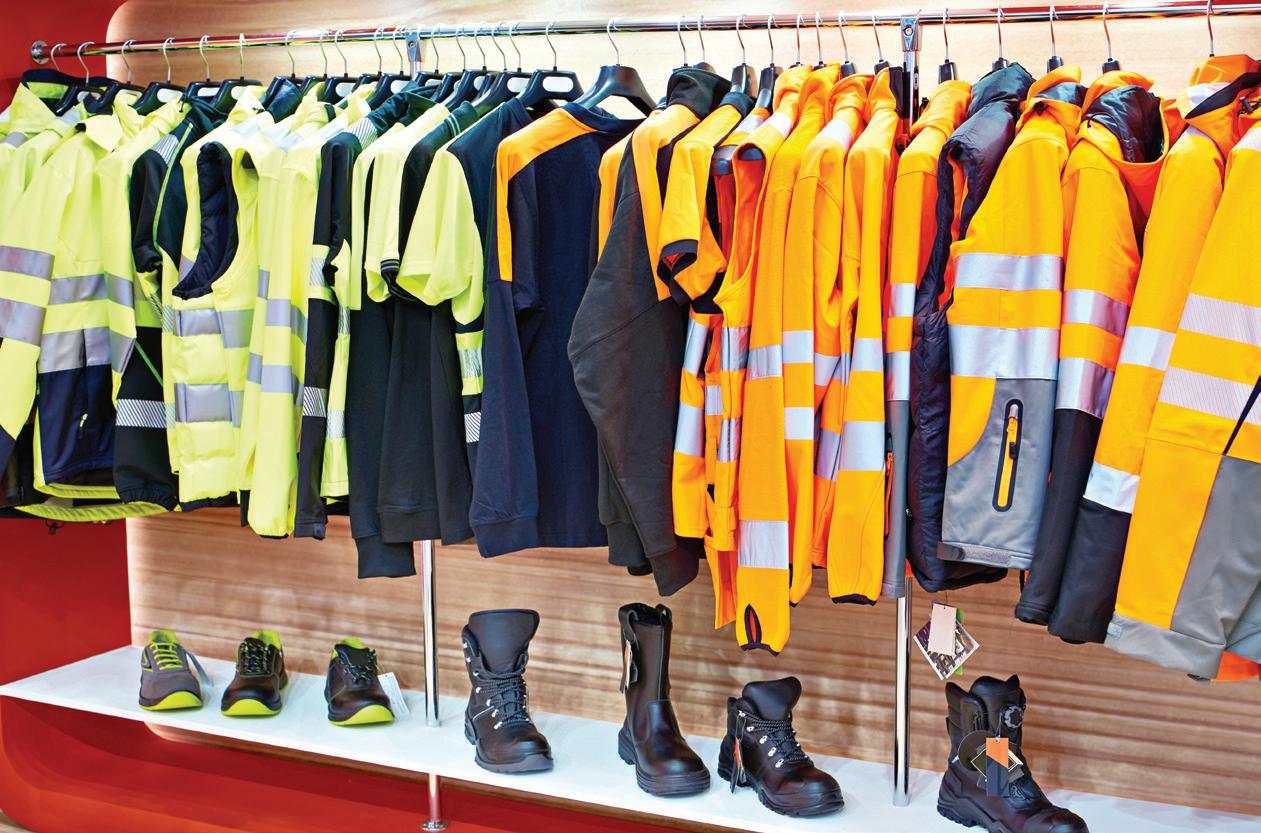
CATEGORY FOCUS - SAFETY AND WORKWEAR
Beeswift’s Envirowear clothing collection
33 WORKPLACE360 - JUNE 2024
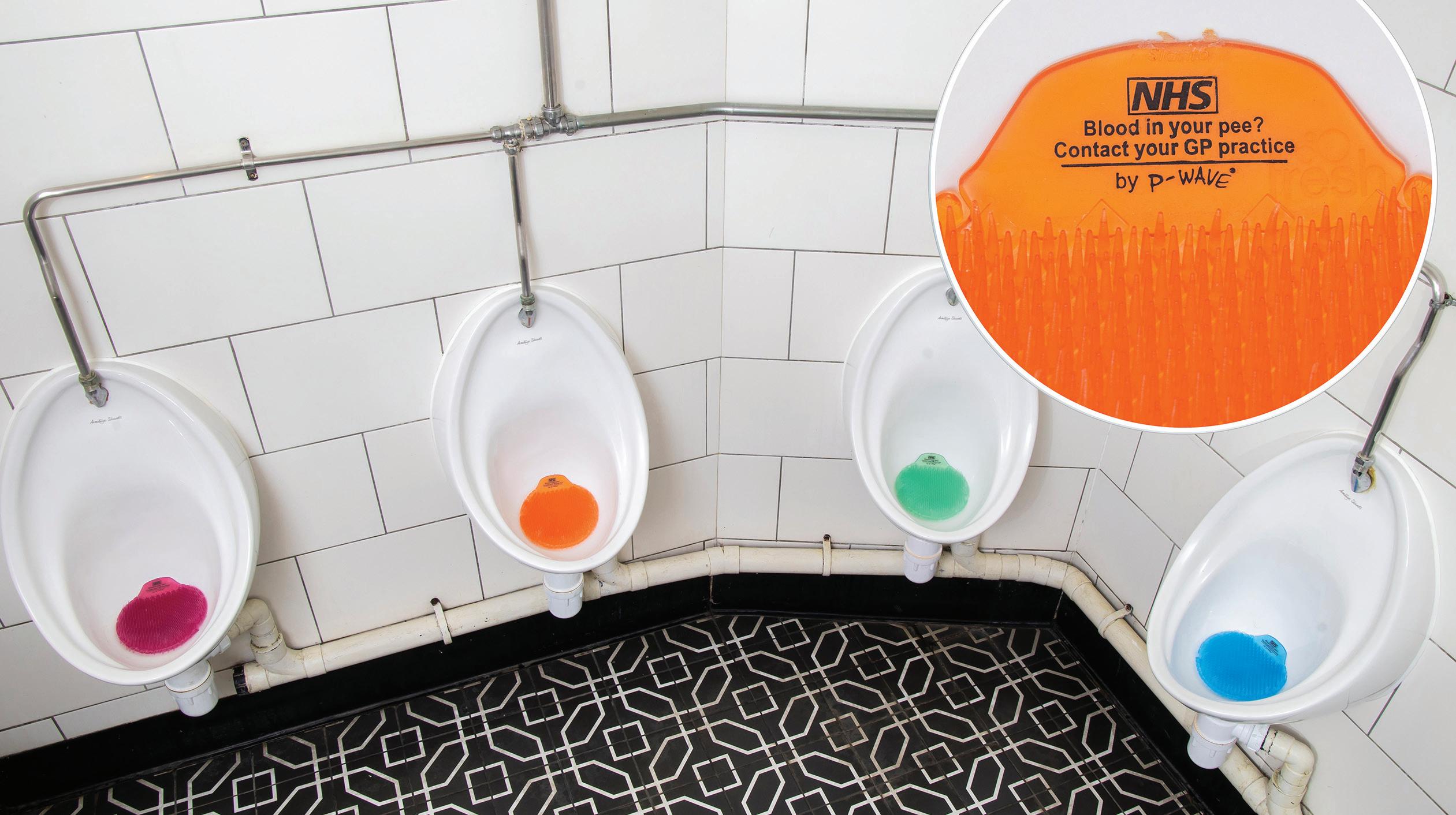
Making waves
P-Wave’s urinal screens are turning washroom breaks into health checks
Recent NHS statistics reveal a concerning underestimation of critical cancer symptoms among men. Alarmingly, 46% of surveyed men failed to recognise blood in urine as a potential cancer indicator, and 39% admitted they would wait to see this symptom multiple times before consulting a doctor. This can delay the detection of urological cancers such as prostate, bladder and kidney cancers, which rank among the top ten most common cancers for men.
Having blood in your pee –even just once – shouldn’t be ignored because it could be a sign of cancer
Recognising the need for increased awareness, NHS England has partnered with urinal products and air freshener brand P-Wave as part of a critical public health programme. As early detection is crucial as it considerably enhances treatment success rates, P-Wave has integrated the message ‘Blood in your pee? Contact your GP practice’ on its urinal screens.
NHS research shows that just over half of men in England use a public urinal at least once a week, while 71% said they would be more likely to contact their GP if prompted by a urinal mat after noticing blood in their pee. Additionally, 64% would view a workplace or venue more favourably if it displayed health-promoting messages in washrooms.

Explaining the significance of early detection and the importance of the P-Wave initiative, Professor Peter Johnson, NHS England National Clinical Director for Cancer, says: “Having blood in your pee – even just once – shouldn’t be ignored because it could be a sign of cancer. Catching cancer early gives people a much better chance of successful treatment; this is why we have a huge focus on finding new ways to reach people in their communities.”
Although the first products containing the message were only available from December 2023, NHS chiefs have already highlighted the pivotal role of P-Wave’s urinal screens in helping boost cancer referral rates, contributing to a record three million health checks in a year (March 2023-Feb 2024).
Found in places such as pubs, workplaces, hotels and restaurants, the simple messaging on the Slant6 urinal screens aims to make every visit to a washroom a direct alert that encourages immediate action. P-Wave has also rebranded its popular Trough urinal screens used in high-traffic areas such as sports stadiums and other large venues to deliver the message to as many men as possible.
A FRESH APPROACH
Says P-Wave Managing Director Dave Carson: “For P-Wave to be involved in this initiative was a nobrainer. The partnership with NHS England is unique and extraordinary, and it’s working – by June, we expect to have placed around 400,000 of these urinal screens in thousands of venues.
VITAL SIGNS
ADVERTORIAL - P-WAVE
34 WORKPLACE360 - JUNE 2024
“For dealers, it’s a way to get behind a programme which is literally life-saving as well as help their customers with environmental and social goals and demonstrate they care about employee and visitor wellness. It’s taken washrooms to another level making them not only clean and hygienic, but also by making them a centre for men’s health.”
To boost the messaging, dealers can access a toolkit – assets include posters, videos, web banners, images and tech sheets – which can be downloaded from the P-Wave website at www.p-wave.co.uk/nhs.
The Slant6 screens are available in six fragrances that last for a minimum of 30 days and also feature an angled bristle design for virtually ‘zero splash’, lower VOCs and double-sided installation. They are compatible with all urinals. The Trough versions are available in two fragrances and help reduce blockages by preventing debris from going down the drain.
GREEN AND CLEAN
On the sustainability front, P-Wave leads by example, having developed the only market-available urinal screens that are both recyclable and biodegradable. Independent tests have demonstrated that nearly 70% of these screens decompose if sent to landfill, with a goal of complete degradation within ten years.
However, as P-Wave Sales and Marketing Manager Mark Wintle explains, the aim is for the urinal screens to be recycled: “The screens are 100% recyclable, but when they’ve been used for a month, it doesn’t always happen. Say 60% get recycled, then 40% go to landfill; we need to ensure there is a safety net. We use EcoPure, an organic plastic additive that significantly speeds up biodegradation, ensuring they break down more quickly.”
P-Wave has also developed a comprehensive range of air freshening systems for washrooms that work in harmony with the urinal screens and are perfect for placing in other strategic workplace environments.
For dealers, it’s a way to get behind a programme which is literally life-saving
The product line includes passive air fresheners such as the traditional toilet Bowl Clip, stick-on Curve and standalone or dispenser-based Eco Air, as well as active systems such as the Easy Fresh (wall or ceilingmounted), the plug-in OurFresh-e and the Bluetoothenabled Scentaura BT diffuser.
Meanwhile, the newly upgraded 2.0 version of the MyFresh air freshener features a sleek dispenser design and is a motion-activated, battery-operated product ideal for small spaces such as desks, elevators and personal areas.

46% of men would be more likely to contact their GP if they saw urinal mat messaging 71%
of men did not know blood in urine
is a symptom of cancer
ADVERTORIAL - P-WAVE 35 WORKPLACE360 - JUNE 2024


Positive vibes
Under new owners, the London Stationery Show was on top form
The London Stationery Show – now in its 12th iteration – offered a buzzy vibe for exhibitors, retailers, buyers and dealers in the stationery and gift sector. Held at the Business Design Centre in London, this year’s show marked a notable milestone as the first under the ownership of Max Publishing, and it certainly injected fresh energy and enthusiasm into the proceedings.
From the moment the doors opened, the show was humming with activity. Buyers from major retailers such as Tesco, John Lewis and WHSmith explored the array of art, crafts, writing and paper products presented by over 100 exhibitors representing more than 300 brands.
Exhibitors included companies from the workplace supplies industry such as ExaClair, Nemo Office Club, Victor Stationery, Sinclairs, edding and Pukka Pads; alongside leading brands from the world of writing instruments, such as Crayola, Pentel, Zebra Pen, Staedtler, Stabilo and Pilot Pen UK.
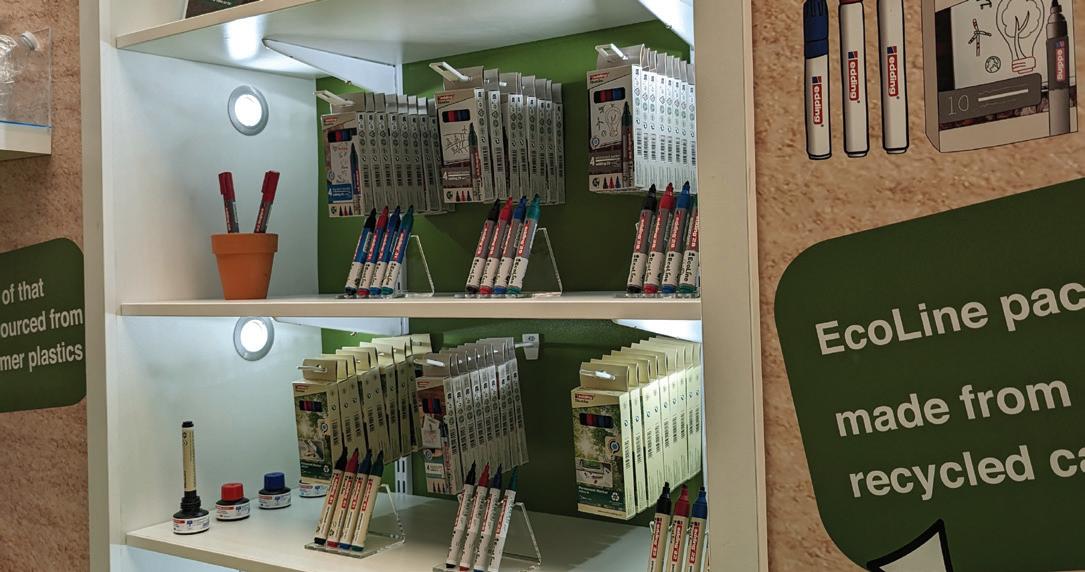

A highlight of the event was the special appearance by Ryman’s Theo Paphitis [Ed’s note: Paphitis is next
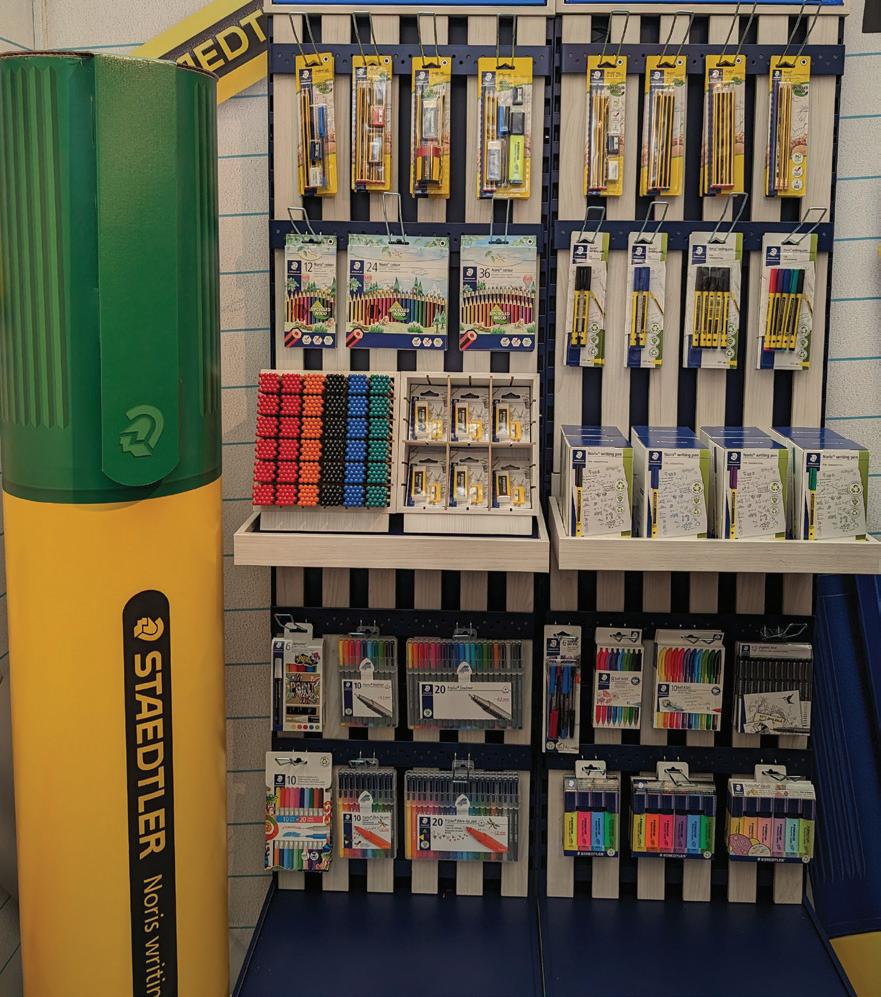
REVIEW - LONDON STATIONERY SHOW 36 WORKPLACE360 - JUNE 2024
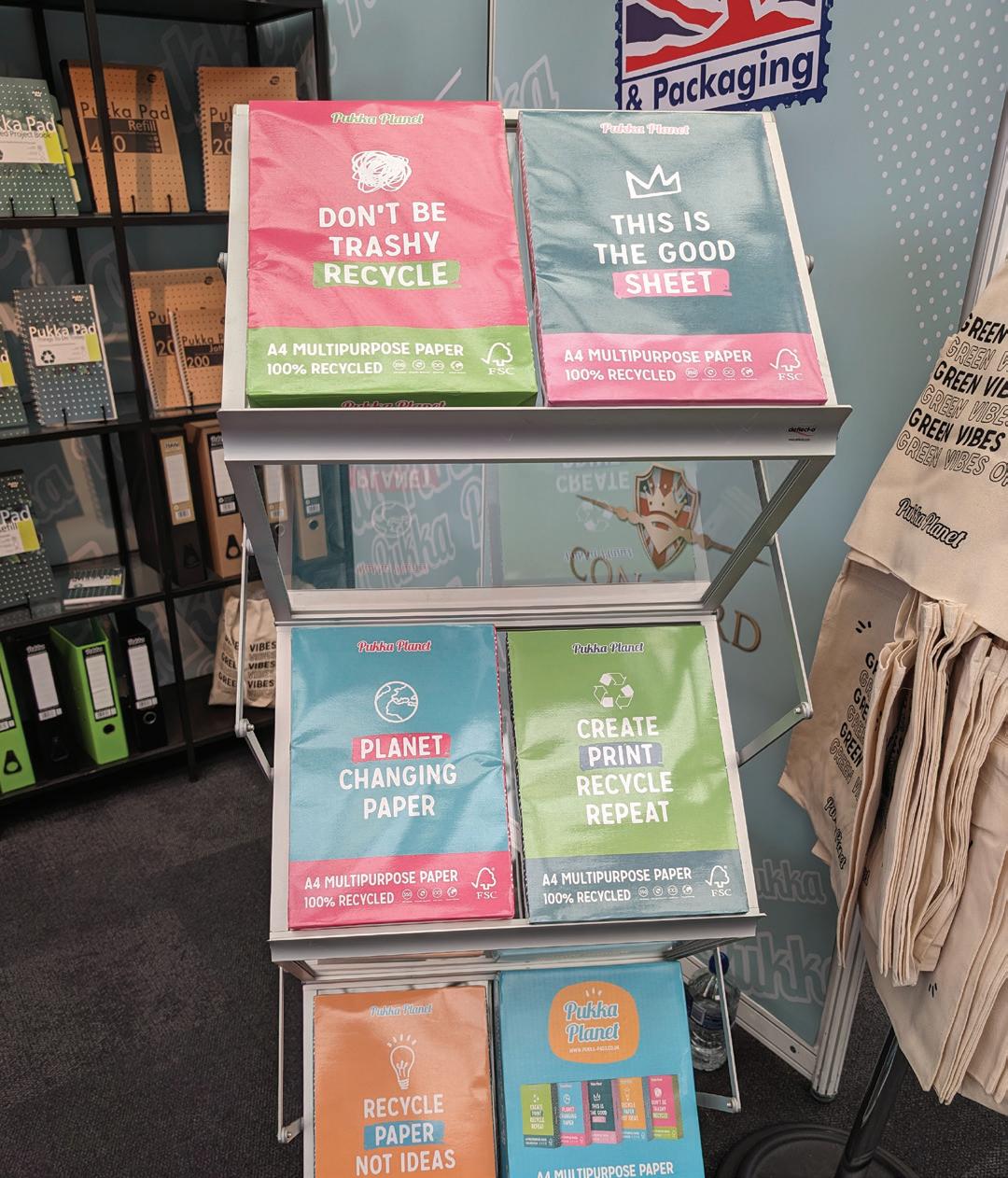
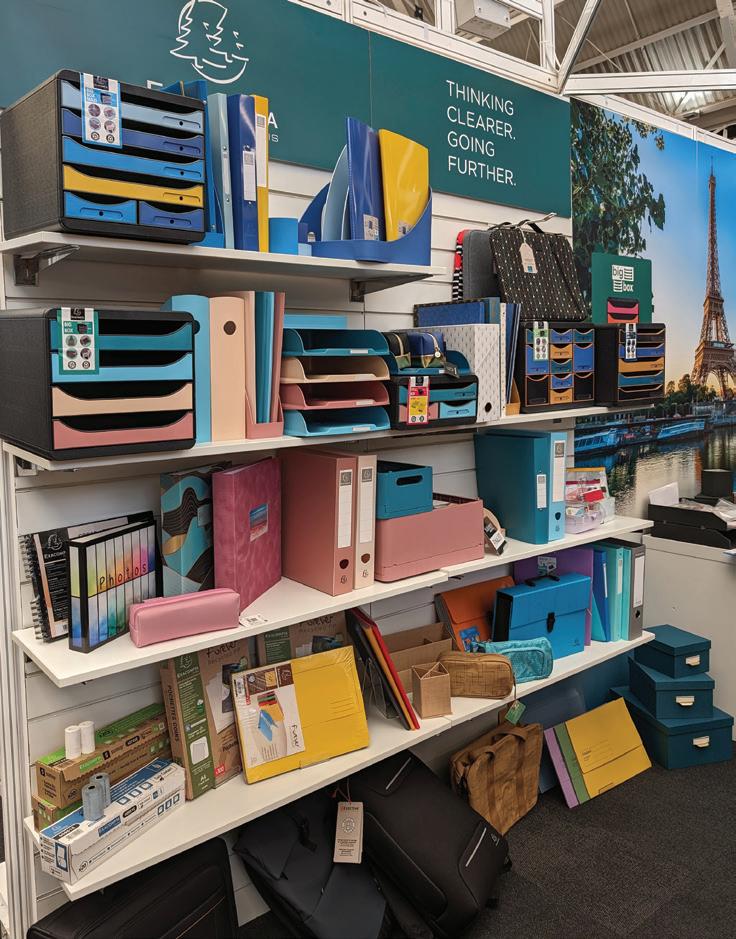
issue’s In conversation with ], whose talk during the lunchtime slot drew a large crowd. Offering insights into his love of stationery, the state of the high street and his disdain for business rate taxes, his engaging 30-minute talk was both entertaining and informative.
The Workplace360 team do, however, miss the talk by trend forecasting agency Scarlet Opus which used to take place when Chris Leonard-Morgan owned the event. Interestingly, Leonard-Morgan is back on board at the London Stationery Show as a special advisor.
Feedback from exhibitors and visitors alike that Workplace360 chatted with at the show was overwhelmingly positive
Attendees also had the opportunity to participate in a series of workshops and talks covering a wide range of topics, from bullet journalling and clay modelling to handwriting analysis, sustainability and brand building.
On the ground floor, the boutique collection featured independent retailers with unique and innovative product offerings, adding a touch of creativity and quirkiness to the show. There was something to capture the imagination of every attendee.
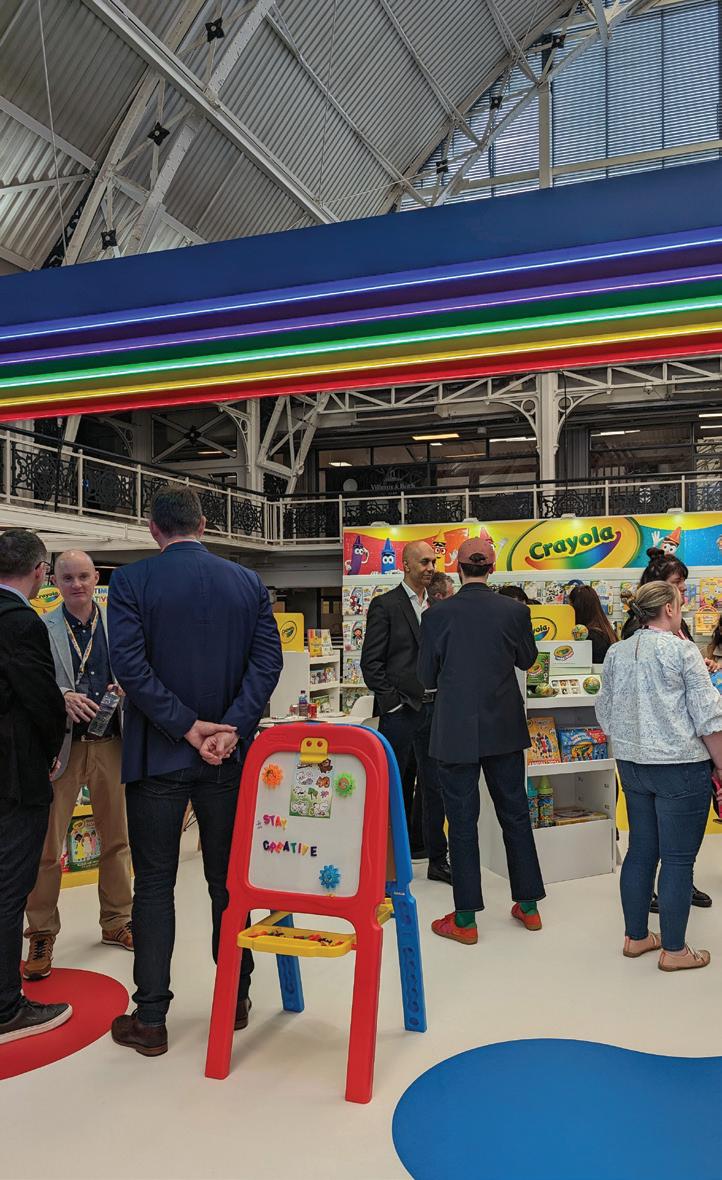
Feedback from exhibitors and visitors alike that Workplace360 chatted with at the show was overwhelmingly positive, with many praising the show’s vibrant atmosphere.
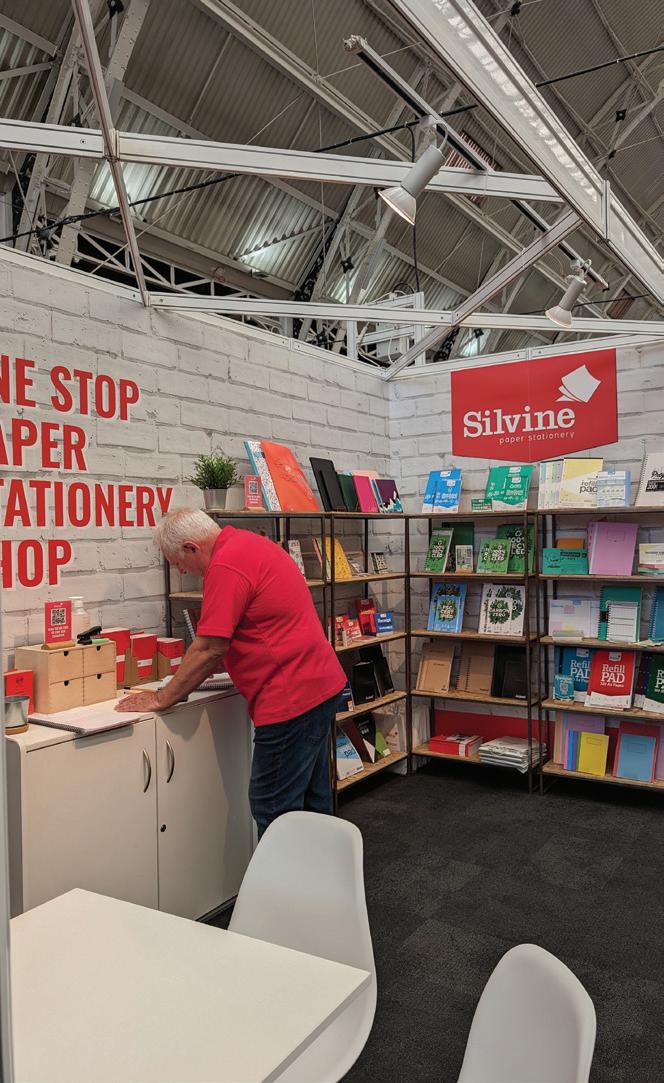
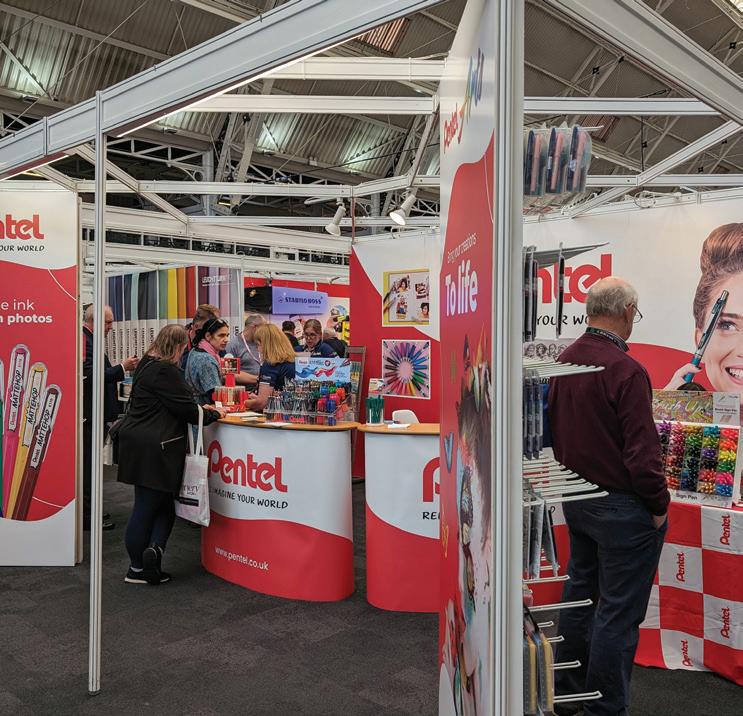
The opening day of the London Stationery Show featured the Stationery Awards. Judged by an independent panel of leading retailers across 12 distinct product categories, the awards recognise outstanding product innovations in the stationery sector. There were over 70 products nominated from 40 different brands. The winners were:
• Novelty Stationery Product of the Year: Stone Marketing –Legami Erasable Pens
• Arts & Crafts Product of the Year: Brainstorm – Eugy 3D Model Kit
• Writing Instrument of the Year: Andhand – Aspect Retractable Pen
• Children’s Stationery Product of the Year: Stone Marketing –Faber-Castell 20 x Connector Fibre-Tip Pens in Dinosaur Tin
• Working From Home Product of the Year: Coffeenotes –Organiser Set
• Sustainable Stationery Product of the Year: Exacompta Clairefontaine (ExaClair) – Clairefontaine Bamboo Watercolour Pads
• Diary or Organiser of the Year: LEUCHTTURM1917 – Weekly Planner and Notebook with Dotted Pages

• Licensed Stationery Product of the Year: Manuscript Brands – LEGO Harry Potter Box Set with Diary, Broomstick Pen & Accessories
• Notebook or Journal of the Year: LEUCHTTURM1917 – Bullet Journal Pocket Edition
• Filing or Storage Product of the Year: Mann Inc – Endless Stationery Five Pen Companion
• Social Stationery Product of the Year: Huunuu – Big Conversations Before I Die Journal
• The Icon Award: Studio Pens – Kaweco Classic Sport Fountain Pen
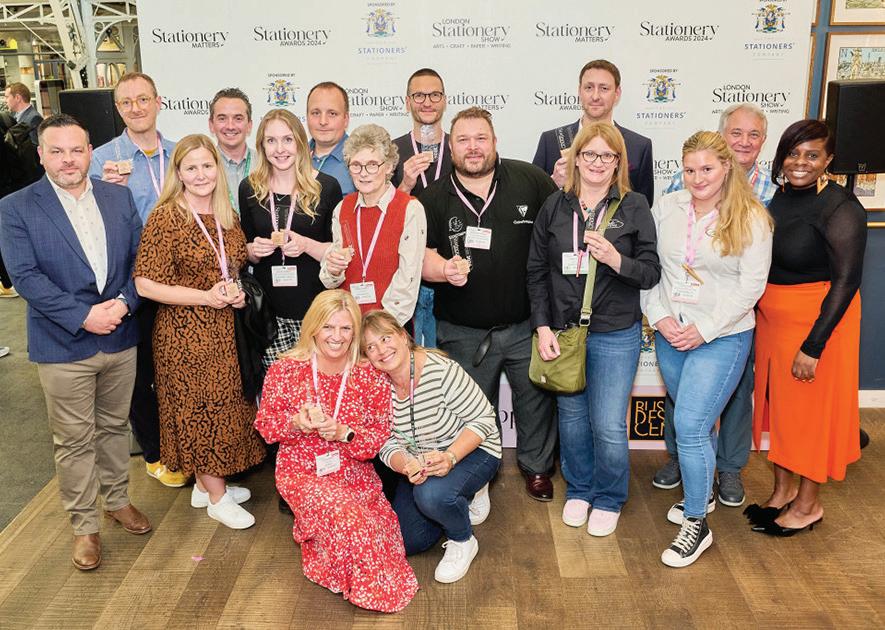
REVIEW - LONDON STATIONERY SHOW
37 WORKPLACE360 - JUNE 2024
Estimated CAGR of the eLearning market to 2027
Source: Global Market Insights

Tech and tradition
Even as budgets shrink, opportunities for growth persist in the education sector – if you know where to look. By Michelle Sturman
The UK education budget reveals some staggering figures. According to the Institute of Fiscal Studies (IFS), in 2022-23, total public spending on education was £116 billion (including the cost of issuing student loans and adjusted to 2023-24 prices). However, this expenditure has dwindled as a share of national income to approximately 4.4%, down from around 5.6% in 2010-11.
Meanwhile, the government has announced that core school funding in England will increase by over £1.8 billion in 2024-25 compared to the previous financial year, bringing the total to just under £60 billion. Nonetheless, the IFS predicts a 5% rise in school costs will result in a £700 million shortfall, effectively diminishing the purchasing power of school budgets by 1%.
While there have been challenges in selling to the education market post-COVID, there’s a prevailing sense of optimism for the upcoming year. Adam Smith, Sales and Marketing Director at specialist school furniture supplier Morleys, points to several difficulties. These include staff retention and recruitment, attainment and attendance issues, and budgets being stretched by increased maintenance costs and rising energy bills.
However, despite the overall downturn in school furniture procurement, the company has experienced a surge in sales compared to the previous year and forecasts growth for 2024. Smith explains: “Schools have been investing in key collaboration areas such as libraries and sixth-form centres, as well as specialist areas such as labs. There has also been increased popularity of sensory areas to support students with special education needs and disabilities.”
Furniture manufacturer Rocada also anticipates growth this year. Export Sales Area Manager Arnau Vergaguer says: “The education sector is a significant part of our sales and Rocada is currently experiencing growth as we continue to expand our range.” He advises dealers to offer unique and exclusive solutions rather than sticking to traditional products, given the saturation of the market with standard offerings.
GOOD TIMING
From a dealer perspective, Egan Reid has observed positive signs following a steady Q1, with anticipation building for the busiest six months of the year. Managing Director Bruce Davie remarks: “Despite changing habits and sometimes unpredictable purchasing patterns, the run-up to the summer holidays
CATEGORY FOCUS - EDUCATION
21% 38 WORKPLACE360 - JUNE 2024
and the new academic year in September constitute the key buying season for schools. Our summer bulk order campaign delivered record sales in 2023; and just a few weeks into our current campaign, the early indicators are very positive. We have a busy schedule of refurbishment projects lined up, so we have every reason to be optimistic.”
Establishing a credible presence is crucial when selling to the education sector. Vanya Hunter, Marketing Director at Stabilo UK, stresses the importance of supporting products through promotional and marketing activities both on and offline: “It’s a crowded market with sometimes little difference between rival products and suppliers, so any exposure is valuable.”
The State of Selling to Schools 2023 report by marketing agency Sprint Education reveals that nearly 30% of schools make their biggest purchasing decisions in September, followed by June and then April, when new budgets are released. September is also prime time for purchasing decisions involving routine, cyclical contract renewals and subscriptions.
For secondary schools, June and July are ideal for making purchasing decisions as teachers have more time following the busy exam period. March and April are also advantageous, aligning with the end and start of the financial year.
Getting a foot in the door is one of the most arduous tasks when selling to the education sector. Staedtler
Head of B2B & Education Justin Kingseller advises dealers to focus on regular, repeat consumables orders throughout the year or specific projects like an office or staffroom refit rather than trying to secure peak orders. He suggests: “Schools will likely already have an existing supplier offering a range and prices you can’t compete with. Instead, focus on where your expertise or service may be particularly valued.”
Alfie Temple – Marketing Manager at Eastpoint Global, a specialist distributor of teaching aids and classroom resources – highlights the importance of understanding how schools operate, as staff often juggle multiple roles, especially office staff. He explains: “They are often very tough gatekeepers, but if you can engage them with something interesting and deliver as promised, you have a good chance of forming a long-term relationship.
Focus on regular, repeat consumables orders throughout the year or specific projects
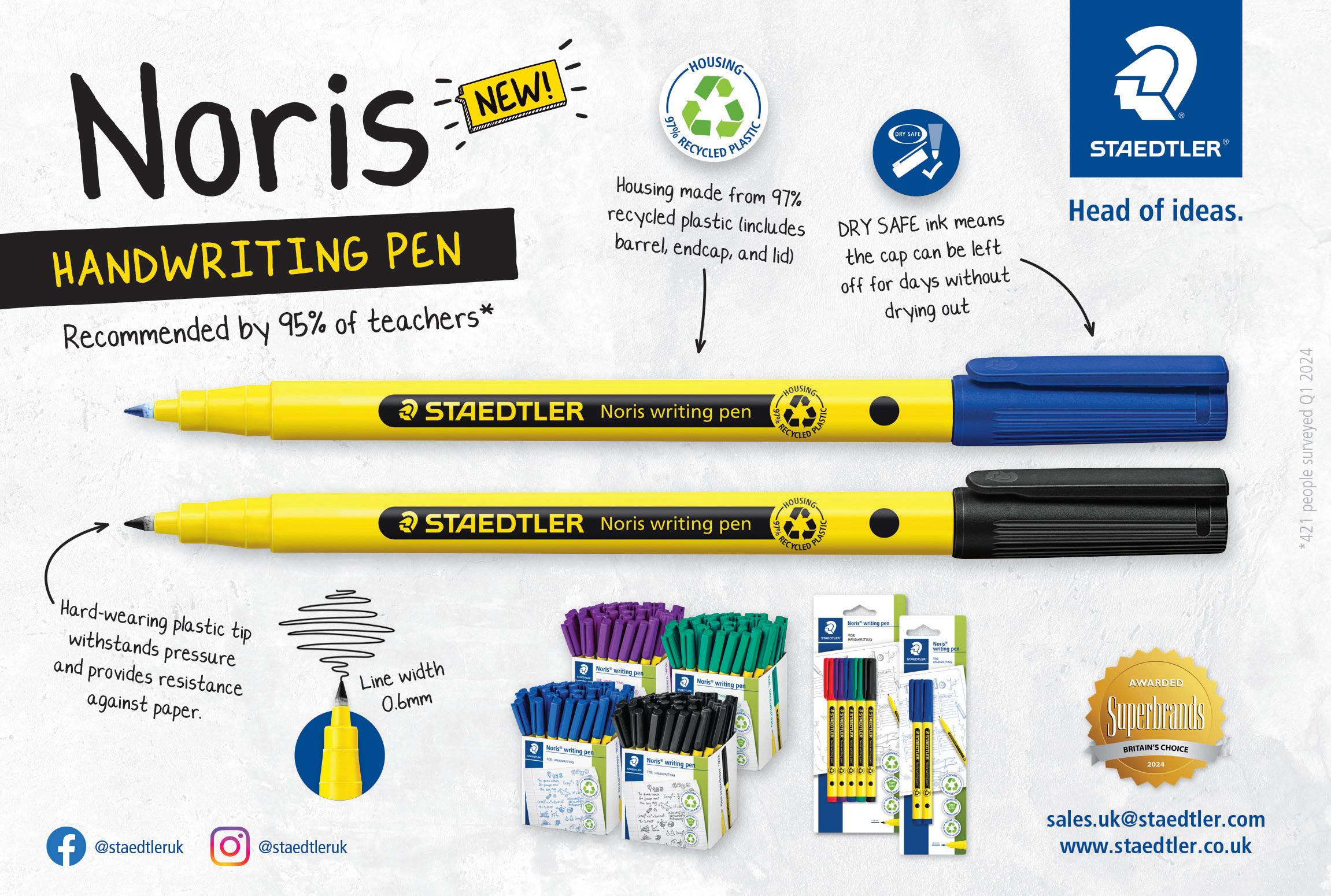
CATEGORY FOCUS - EDUCATION
39 WORKPLACE360 - JUNE 2024

Schools need products specifically designed for them, not just repurposed from the office products industry
“Delivering goods directly to the storeroom or a specified location can help win them over faster. Schools need products specifically designed for them, not just repurposed from the office products industry. Design, colours, pack sizes and packaging are all important considerations for schools.”
Writing instruments and stationery remain major sellers in the education sector, although continued budget constraints are shifting purchasing patterns towards trade and own brand products. Educational distributors are increasingly sourcing comparable products to bestselling brands and replicating popular pack sizes.
Says Hunter: “In recent tenders and range reviews, we have focused on providing an entry point to the brand. This might be via a new product type such as our NEON highlighters, or smaller, more budget-friendly pack sizes for our bestselling lines.”
Kingseller concurs, adding that pricing is becoming increasingly critical and emphasising the need for schools to acquire fit-for-purpose, value-for-money products: “It’s difficult for buyers to take a chance on a product because they only get that money to spend once a year. We’ve chosen to add value rather than reduce product quality to meet a certain price point.
“We have involved our key education customers in our medium- and longer-term strategy for product evolution to ensure it aligns with their needs and, most importantly, those of their schools.”
Certain educational supplies are seeing a decline, particularly those that are heavily paper-based, such as filing products. In response, Eastpoint Global has strategically removed various items from its range to accommodate these shifts.
However, as Temple points out, items such as pencils, glue sticks and whiteboards remain in high demand. To deal with budget challenges, the company has focused on adding value to its products by including extra freebies, offering bigger bulk packs and more.
Flo Turak, Head of Marketing at Egan Reid, agrees with Temple’s assessment: “Traditional products such as exercise books, writing instruments and glue sticks don’t seem to be affected by pressure on budgets or the move to digitalisation.”
An important and growing area is catering for those with learning difficulties and disabilities in educational environments. There is an increasing availability of products designed to support these needs. These include tinted notepads and exercise books from companies such as Sinclairs, Pukka Pads and Victor Stationery, which help alleviate issues associated with visual perception disorders such as Irlen Syndrome.
TECH SHIFT
ExaClair Marketing Manager Lawrence Savage says while there is an increased use of technology in educational environments, he has observed a notable surge in demand for crafting supplies and notebooks alongside a significant rise in collaborative projectbased learning. These have been driving sales of ExaClair’s modular storage units, recycled flipchart pads and filing solutions.
Bi-Silque’s Bi-Bright division is committed to serving the education market, simplifying the intricate processes for both dealers and wholesalers.
CATEGORY FOCUS - EDUCATION
40 WORKPLACE360 - JUNE 2024

According to Marketing and Product Manager Sandra Gomes, Bi-Bright’s focus is on understanding the evolving needs of educational institutions, enabling the team to identify innovative solutions and opportunities that align with their objectives.
To this end, the Bi-Bright team notes that the integration of teaching apps and tech devices in the classroom and the adoption of new methods to engage with students have heightened demand for interactive flat panels and modern furniture.
Adds Gomes: “The education market is undergoing dynamic evolution, characterised by the embrace of technology such as touch panels but also other resources such as charging stations and mobile all-inone seats for quick classroom layout reconfigurations.” Echoing this sentiment, Rocada’s Verdaguer notes a

of secondary schools are expected to reduce spending on EdTech
Source: BESA Spring 2024 Compass Report
similar trend towards digital interactive boards on the viscom side – an area the company is actively pursuing.
Despite the anticipated impact of budget constraints and a natural slowdown in purchasing post-pandemic, the EdTech sector is witnessing nuanced shifts in demand as educational institutions adapt to evolving technology needs. Logitech Public Sector Lead Chris Hopkins explains there has been an uplift in Microsoft Teams rooms on Android, for instance, following a move away from traditional PC formats.
Along with an increase in all-in-one video bar solutions as hybrid learning continues, Hopkins says educational institutions are gravitating towards lighter, more manageable technologies, with a strong emphasis on comfort: “We’re seeing simpler yet effective solutions, such as ergonomic mice and keyboards gaining traction.”

53%
CATEGORY FOCUS - EDUCATION 41 WORKPLACE360 - JUNE 2024

Moreover, he states, there’s a growing emphasis on personalised learning within digital environments: “Technologies such as interactive tablets and pens empower students to organise their thoughts in ways that best suit their learning styles, reflecting a broader shift towards more tailored educational experiences.”
There are plenty of other prospects in EdTech. Morley, for example, offers a range of furniture with integrated power and data – from charging hubs to soft seating. States Smith: “Our in-house design team are creating flexible and collaborative spaces that incorporate different types of media and technology.
“Even our marketing activities are focused on digital, which means further opportunities for us to improve the customer experience, as we can provide schools with 3D visualisation so clients can see the furniture and equipment in situ before committing.”
Meanwhile, Bi-Silque’s Bi-Bright division is committed to blending digital teaching with analogue tools, exemplified by its ‘Analogue meets Tech’ project. “This has led to the development of traditional products such as trio boards or pillar boards integrating interactive touch screens, chairs with tablet holders etc,” explains Gomes.
The potential for growth in EdTech remains substantial, as highlighted by Eastpoint Global’s Temple, who says he is surprised at the relatively low level of technology integration in classrooms – especially in primary schools. However, he acknowledges the rise of technology and the need to adapt accordingly: “We cannot bury our heads in the sand and have various developments in the pipeline.”
GREEN SHOOTS
Despite the Department for Education’s Sustainability and Climate Change Strategy, buying ‘green’ in education procurement remains elusive. According to Egan Reid’s Davie: “There’s no doubt sustainability has become a core topic in education, although how much it’s impacting procurement decisions remains to be seen. Price, availability and service are such prevalent factors that we’re not yet seeing evidence of a genuine green agenda from our education customers.”

Sustainability has become a core topic in education, although how much it’s impacting procurement decisions remains to be seen
Despite this, suppliers remain committed to pursuing their green agendas. Smith believes schools are increasingly cognisant of their sustainability responsibilities and are seeking ways to improve their procurement practices: “We promote circular economy and waste reduction and help schools to do this through our FF&E legacy surveys. We are seeing an increased demand for these services as they not only save schools time and money but help them to identify furniture and equipment that can be repurposed.”
ExaClair’s Savage agrees that although pricing is indeed a key purchasing factor, sustainability is now playing a pivotal role in decision-making across various aspects, from product materials and packaging to manufacturing and distribution operations.
Staedtler’s Kingseller concurs, stating that many of the company’s key lines have been reconfigured to provide the most sustainable product possible while not compromising on quality. He points to Staedtler’s market-leading Noris pencils, which are now made from upcycled wood.
It’s the same story at Eastpoint Global, as Temple explains: “At a school level, most of the time price has to come first. This has meant our product development is focused on items which are not just sustainable but great value by being no more expensive and last longer.”
It’s clear that selling to the education sector brings its fair share of challenges, and success hinges on establishing strong relationships and becoming an indispensable partner. Davie says one of Egan Reid’s core strengths is building on its customer relationships, often developed over many years: “It’s a factor that seems to bear an even greater value in education than it does in the B2B arena. We get a lot of feedback from schools about lack of trust and being let down by competitors.”
CATEGORY FOCUS - EDUCATION
42 WORKPLACE360 - JUNE 2024
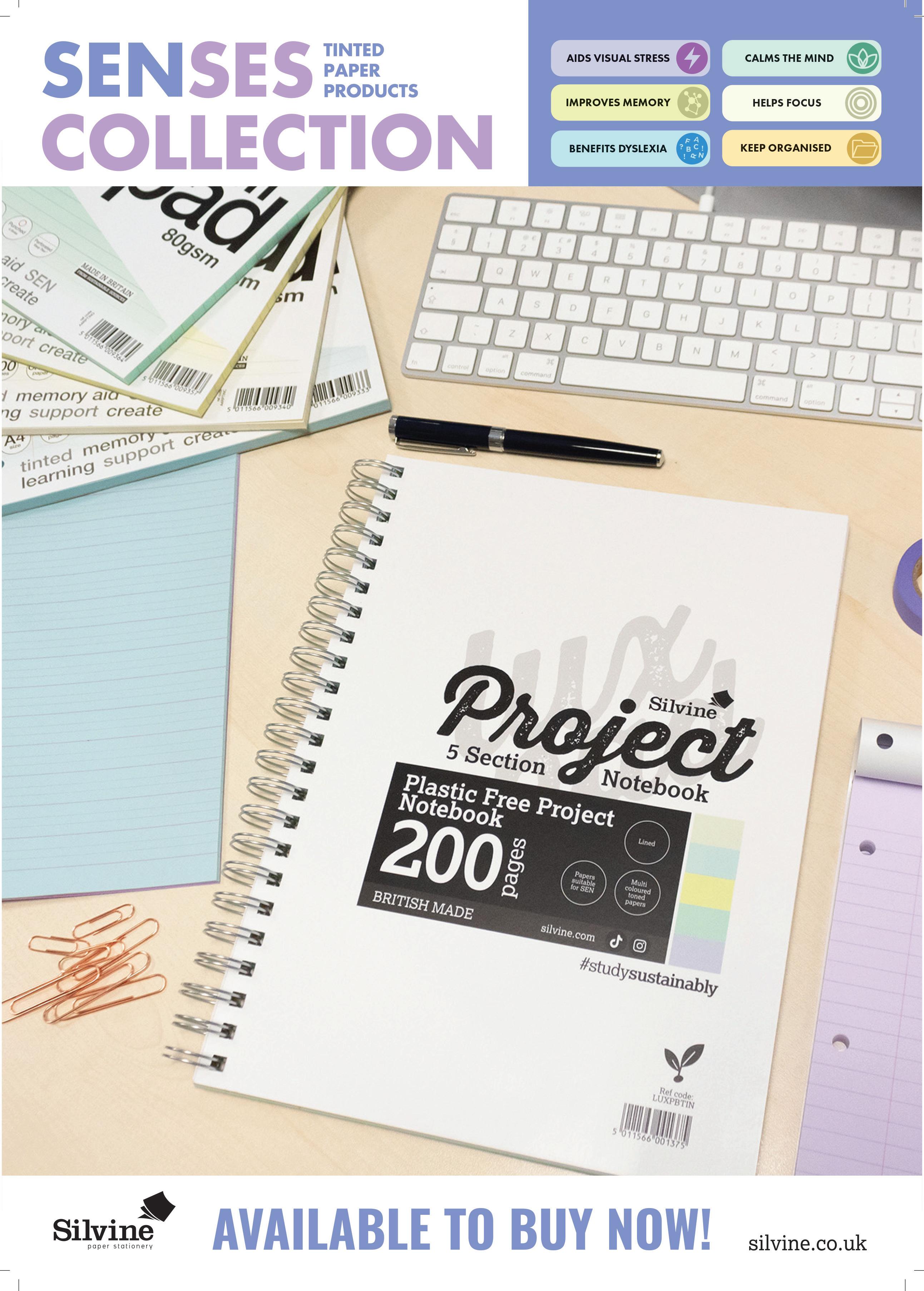

View from across the pond
Workplace360: Despite your retirement, you continue to play an advisory role on the boards of various independent resellers, focusing on strategic development. Typically, what are the challenges you’re assisting with?
Mike Maggio: Great question. A principal challenge for any company, but certainly in our neck of the woods, is devising an effective business strategy. It’s now widely accepted that the OP market is in decline and no longer represents the future of our sector. While no one’s exiting the OP market, growing it – that’s tough.
The strategies for growth generally revolve around organic development or acquisitions. A critical part of our discussions involves identifying key product categories that are essential today, alongside exploring potential adjacencies and the opportunities of tomorrow. These are the three biggies.
Workplace360 spoke to recently retired US industry doyen
Mike Maggio – former CEO of wholesaler S.P. Richards (20202023) and President of TriMega Purchasing Association/CEO of ISG (2013-2020) – for an honest opinion on what independent dealers should really be doing…
Succession planning is another hot topic. Many resellers are woefully behind on this and lack a strategy for any leadership transition, regardless of business size. There’s also a focus on how the organisational structure should look today and how it must evolve.
W360: So what are these essential and potential product categories you mention?
MM: Admittedly, some of them are cookie-cutter, but if dealers are not selling cleaning and breakroom today, there’s a real problem because it’s almost passing them by. They will need to buy another business, as entering this category organically is no longer feasible.
The fact that furniture remains a significant growth area is often overlooked. For some reason, we’ve also consistently ignored technology, even though the modern office – which we still claim as our cornerstone – is highly tech-based.
As for potential categories, I’m talking about adjacencies such as foodservice and cleaning services.
INTERVIEW - MIKE MAGGIO
44 WORKPLACE360 - JUNE 2024
Safety products and medical supplies also represent a large, mostly, untapped market.
W360: I can’t believe many dealers haven’t figured out jan/san and breakroom.
MM: None that we would consider progressive, right?
W360: What else should they be doing?
MM: Dealers need to lay the groundwork for growth by aggressively exploring what’s right in front of them as well as considering future opportunities. I’ve already said that jan/san and breakroom are absolutely critical.
I’ve mentioned furniture but also think about the contract side here. This area is interesting because services – such as design solutions – are in demand. Furniture people recognise the difference between service and products and expect to get paid for service, something which our industry has always thought should be free. We can’t live that way anymore. We’ve got to unbundle what we do and how it’s done.
The barrier to entry for large-scale projects isn’t as high as some dealers think, but it is a different business and hiring expertise is crucial. It’s certainly easy to develop because your customer base is already engaged; it’s just doing it with someone else.
Promotional products is another lucrative area and requires minimal expertise – just one person could manage it. With customisable websites available, it’s among the most straightforward businesses to enter. MRO is most definitely an opportunity. Platforms like ECI’s EvolutionX simplify the integration process, making it easier for dealers to access this sector.
Finally, I keep reminding dealers that they can move into the contractual space without getting into managed print. HP Inc, Brother, Lexmark and Xerox, for example, have programmes for contractual ink and toner. Ignoring this is a huge mistake.
W360: I guess the difficulty has been figuring out how to step beyond just playing in those particular sandpits. Our industry has always done a good job of shifting boxes and generally operated at the commodity end.
MM: If you ever looked at resellers’ balance sheets and P&Ls, you’d see consistent underinvestment in key business areas. Marketing has always been a stepchild, and so has IT. Even growth plans are often lacking. Very few dealers acknowledge the investment required to elevate their operations to where they need to be. While sufficient for commodities such as paper towels and toilet paper, wholesaler marketing support fails to meet the demands of a forward-looking business model. The existing entrenched structure is ill-equipped for future challenges and the world has got to be viewed differently.
W360: What’s your advice for dealers to equip themselves for the future?
MM: First, you have to admit you need to invest, which means investing in people and infrastructure. Which
comes first? For me, it’s always been about people. I learnt a long time ago that there is a huge difference between effectiveness and efficiency. We tend to think they’re the same, but they’re not. You have to be effective first – then you can pay for efficiency.
The key investment must be in people, which can be achieved through acquisition. Many astute resellers have acquired jan/san and furniture capabilities this way. The right people can do wonders for a business. If you think your folks are going to figure all this out on their own, they won’t. This is always my advice on where to start.
Dealers must understand they need to spend some money. Funding will likely have to come from existing cash flows and loans, and although some support may be available from vendors, it won’t compare to past levels of assistance.
W360: It seems a significant mindset change is required among independent dealers.
MM: Absolutely. I don’t want to downplay the fact that a number of dealers have been successful, as there are many very progressive businesses out there. But as an industry, we fall horribly short.
If you think your folks are going to figure all this out on their own, they won’t
W360: Do you think smaller dealers have a tougher time in general?
MM: Yes and no. The primary challenge for smaller dealers is often the lack of external input. I’ve always been passionate about the value of an advisory board. I don’t care how big your company is, having some level of accountability – even in an advisory capacity – forces you to examine your business periodically.
The key is encouraging dealers to think strategically rather than solely focusing on day-to-day operations. It can be tough for smaller businesses because they don’t have the luxury of a large operations team.
W360: Anything else we haven’t spoken about that you’d like to highlight?
MM: I still think this is one of the most exciting industries. Many entrepreneurs are entering this sector and they bring new energy. This is not a dying business; it’s a mature one.
I’ve just mentioned numerous categories which are absolute opportunities for any independent dealer willing to devote the time, energy and resources. Honestly, I’m disappointed that I’m 69 years old and basically retired because I can’t think of a better time to be in our industry than today.
INTERVIEW - MIKE MAGGIO
45 WORKPLACE360 - JUNE 2024

Turning up the heat
Vicky Dymoke explains the importance of understanding the impact of menopause in
the workplace
World Wellbeing Awareness Week takes place from 24-30 June and is the perfect time to shed light on an often-overlooked aspect of workplace health: menopause. Despite misconceptions that this is solely a concern for older women, the reality is far more nuanced, and its relevance extends to every workplace.
Consider this: there are approximately 10.4 million menopausal women currently employed in the UK, with 4.5 million aged 50-64. Contrary to popular belief, menopause isn’t tied to age; for some people, it can onset as early as their 20s or 30s. While women over 50 are the fastest-growing demographic in the workforce, businesses must recognise that menopause doesn’t just affect this age bracket and be aware of the ramifications of neglecting support for menopausal employees.
You might wonder why this matters in a maledominated industry. The answer lies in the pervasive impact of menopause, transcending gender lines and affecting workplaces across all sectors. The NHS highlights that the average age for menopause in the UK is 51. However, it’s crucial to recognise that it can begin much earlier, with 1 in 100 women starting their journey before the age of 40 and 1 in 1,000 before they reach 30. For many individuals navigating menopause, it means at least 25% of their working life will be spent transitioning through this significant stage.
HIDDEN IMPACT
Findings from the House of Commons Women and Equalities Committee report, Menopause and the Workplace, released in July 2022, highlight the challenges
 Vicky Dymoke is Chief Marketing Officer at Meno Plan
Vicky Dymoke is Chief Marketing Officer at Meno Plan
faced by women – and some trans men and non-binary people – in the menopausal age group. Despite being highly skilled and experienced, often at the pinnacle of their careers and serving as role models for younger colleagues, many women feel compelled to leave their jobs due to menopausal symptoms.
The report revealed alarming statistics: women who stated experiencing at least one problematic menopausal symptom aged 50 were 43% more likely to have left their jobs by the age of 55, with 23% more likely to have reduced their working hours. This exodus represents a significant loss of knowledge and productivity from the workforce, unnecessarily impacting individuals and businesses.
Those aged 50 to 54 have the highest suicide rate among women
Additionally, a survey conducted by the Fawcett Society and Channel 4 found that 39% of respondents cited anxiety or depression on their sick notes instead of divulging their menopause status. This reluctance to disclose highlights the stigma surrounding menopause and the discomfort many menopausal people feel in discussing their health issues openly in the workplace.
Menopause encompasses far more than just hot flushes; it entails nearly 50 different symptoms, each affecting everyone uniquely. From brain fog and forgetfulness to decreased confidence, heightened anxiety, achy joints and fatigue – these are just a few of the many issues menopausal individuals may face.
Additionally, symptoms like thinning hair, flaky nails, decreased libido and increased facial hair further compound the physical and emotional toll of menopause. Heart palpitations, irritability and mood swings add to the complexity of the experience.
There is a duty of care to menopausalsupport people in workplacethe
BACKCHAT - VICKY DYMOKE AND LAURA WINGATE
46 WORKPLACE360 - JUNE 2024
Moreover, those who are menopausal often juggle numerous responsibilities, including work, caregiving, childcare, household chores and more, all while navigating significant changes in their bodies and minds. It’s a delicate balancing act that can take a toll on mental health and overall wellbeing. Considering all these factors, it shouldn’t come as a shock to find out that those aged 50 to 54 have the highest suicide rate among women, followed by those aged 55-59.
The House of Commons report revealed concerning findings regarding workplace support for menopausal people, with over 25% of respondents refraining from seeking workplace adjustments due to fears of negative reactions. Additionally, the report highlighted the pervasive nature of menopause-related discrimination, characterising it as both “widespread” and “shocking”.
Similarly, the Fawcett Society survey further showed the prevalence of stigma and discrimination surrounding menopause in the workplace, as 41% of respondents reported witnessing menopause or menopausal symptoms treated as a joke by colleagues.
FINANCIAL AND LEGAL IMPLICATIONS
The financial repercussions of menopause on the UK economy are substantial. A survey conducted by Health and Her – as part of the UK Parliament inquiry – revealed the time spent alleviating menopause symptoms costs an estimated 14 million working days per year. Additionally, Oxford Economics suggests replacing a menopausal employee earning just £25,000 annually could cost an employer £30,000.
The issuance of guidelines by the Equality and Human Rights Commission in February of this year calls attention to the growing recognition of the importance of addressing menopause in the workplace. These guidelines clarify that every employer is legally obligated under the Equality Act 2010 to protect workers from discrimination, harassment and victimisation based on characteristics including disability, age and sex.
In practical terms, this means that if a menopausal employee experiences symptoms that significantly
impact their ability to carry out normal day-to-day activities, it could be considered a disability. Accordingly, employers are required to make reasonable adjustments to accommodate these employees.
Menopause workplace management is something maledominated industries need to act on
So, what does this mean for you? Ignoring these issues could potentially lead to costly tribunal cases related to age, sex or disability discrimination, with average costs ranging from £18,000 to well over £225,000. Moreover, there’s the reputational risk to consider, which could have far-reaching consequences for your organisation.
PROACTIVE SUPPORT
affectsMenopauseeveryone and businessevery
Supporting menopausal employees doesn’t have to break the bank, however. Simple adjustments within the working environment such as controlling ventilation, temperature, lighting and noise levels can make a significant difference. Providing easy access to toilets and allowing flexibility in workwear policies can also greatly improve comfort and productivity.
Furthermore, integrating menopause into onboarding and induction processes demonstrates that you prioritise employee health and wellbeing. Consider incorporating e-learning modules into mandatory training sessions and designate menopause champions within your workforce to offer support and guidance.
The conversation around menopause in the workplace is not going away anytime soon. Merely having a menopause policy buried in the company’s intranet or maintaining a clean toilet area simply isn’t going to cut it. Taking proactive steps now to support your menopausal workforce isn’t just a legal responsibility; it’s also a strategic move to protect your business and more importantly, it’s the right thing to do.
BACKCHAT - VICKY DYMOKE AND LAURA WINGATE
47 WORKPLACE360 - JUNE 2024
Workplace360 asked Meno Plan founder and CEO Laura Wingate for advice on how dealers can support their customers in dealing with menopause in the workplace
Workplace360: Let’s kick off by finding out what Meno Plan does.
Laura Wingate: Meno Plan is a provider of menopause training and assistance for businesses. We aim to break down the complexities of menopause and its impact on the workplace through knowledge and support for employees and employers alike. All our courses are co-created with leading experts, from Advanced Menopause Specialist GPs to Mental Health Counsellors and specialists in employment law.
W360: What are some common menopause misunderstandings?
LW: The biggest misconception is that menopause is only a concern for women over 50. This couldn’t be further from the truth, and quite frankly, it’s bullshit. Another crucial point to understand is that menopause doesn’t only affect those who menstruate.
Since half of the population will experience menopause, the other half will inevitably be connected to someone dealing with its effects – be it a partner, friend, family member or colleague. It’s a societal issue that impacts everyone, directly or indirectly.
W360: What are some of the benefits and tools offered by Meno Plan?
LW: We specialise in delivering programmes for businesses that include awareness e-learning training for the whole workforce as well as manager e-learning modules. For those companies who want to do more for their employees, we also offer menopause champion training and in-person deep dive sessions with our

experts from Advanced Menopause Specialist GPs or our specialist menopause Mental Health Counsellors. We know that one size doesn’t fit all, so we can flex our offering to meet the individual requirements of a company and its workforce.
In addition, we offer a unique and holistic approach with our Meno Lounge – a supportive online community that’s freely accessible to menopausal colleagues. They have access to webinars and valuable resources that cover fitness, nutrition and much more.
W360: What would you say to men who may be hesitant to approach a colleague they believe may need support or information about menopause?
LW: I appreciate it can be daunting to broach the subject as it’s a sensitive issue. The first step is to get informed, which is precisely why we’ve developed a training course specifically for managers that can be delivered in person or online. All our courses offer clear advice on how to approach conversations and create an open and inclusive culture.
DEALER OPPORTUNITIES
W360: How can workplace supplies dealers engage with Meno Plan?
LW: We have an affiliate programme where dealers can earn a fee for courses they sell or earn an introduction fee for an organisation that purchases a training programme or resources.
W360: What products can dealers include to make life easier for menopausal people in the workplace?
LW: Quick wins are water coolers, desk fans and air con units – anything to help reduce heat. Wipes and sanitary products support those in perimenopause. Think about workplace clothing and uniforms too –loose-fitting and breathable fabrics are better suited to those experiencing menopause. Ergonomic furniture and equipment are beneficial as this can help with musculoskeletal symptoms of menopause, including muscle aches, osteoporosis and stiff joints.
W360: Any advice for dealers in approaching the topic of menopause in the workplace with their customers?
LW: Menopause in the workplace sits perfectly within any employee wellbeing programme. Let’s not forget it’s not just about women – it will affect everyone at some point and every company has a legal responsibility to support its menopausal workforce. One simple tip for dealers is to find out a customer’s employee demographic and age splits.
W360: Do you have any toolkits available for dealers to use?
LW: Absolutely. We have an employer toolkit and any dealer interested in receiving this can contact us and we can take you through it.
BACKCHAT - VICKY DYMOKE AND LAURA WINGATE
48 WORKPLACE360 - JUNE 2024
Meno Plan CEO Laura Wingate
11-13 NOVEMBER
RADISSON BLU EDWARDIAN BLOOMSBURY STREET HOTEL, LONDON
EUROPEAN Forum 2024

JOIN US FOR AN OUTSTANDING EVENT PROGRAMME TO STIMULATE THOUGHT AND DEBATE WHILE EXPLORING THE FUTURE OF THE EUROPEAN BUSINESS SUPPLIES SECTOR
n Bringing senior executives together from all sectors to better understand the continued changes to our industry.
n Practical takeaways that will enable informed strategic decisions on the direction of your business.
n Learn how peers and industry experts are coping with the challenges and opportunities ahead.
KEYNOTE SPEAKER: Henry Coutinho-Mason

DESIGNING A PEOPLE-FIRST AI STRATEGY
Book now
take advantage of the early rate: opi.net/ef2024 Workplace360 readers get 10% off using the code: EF2024kopl
and



Who is the most famous person you’ve met?
I once met Garry Kasparov, a former world champion in chess. Other than that, I did see the Power Rangers at Butlins when I was six and Santa was a regular at my local pub at Christmas when I was growing up.
Do you collect anything?
Kristian Danielson, Key Account Manager, BIC
Tell us a secret that your work colleagues don’t know about you.
I don’t really have any. I think my colleagues are likely to say they would rather me have more secrets!
Most embarrassing industry moment?
I almost missed my flight to Chamonix, France, for a VOW Whiteout trip – I was circling the airport for two hours because I couldn’t find my parking space.
Favourite holiday so far?
Last year, my wife, daughter and I went to spend time with her family in China and it was out of this world. The technology was so much more advanced than what I’m used to in the UK (or at least in Pontefract) and most importantly, the food was cheap and delicious.
What would be your last meal?
Lobster, lobster and more lobster.


Who is your hero?
My wife, for always supporting me and putting up with me when I know nobody else would.
I’m an avid reader, so you could say it’s books. I’m currently reading a series by sci-fi and fantasy author Brandon Sanderson. I’ve just bought one of his signed leatherbound editions for £250… just don’t tell my wife the price.

Would you survive a zombie apocalypse?
I would probably last longer than most! I’m licensed to own a shotgun and we keep the house well stocked with food. I think my wife would get me long before the zombies though, after I bored her to tears talking about Europe and the Middle Ages incessantly.
What outrageous luxury would you love to have in the office?
A massage chair. I tried one last year; it blew my mind, but at over £5,000, I doubt I can convince BIC this is a valid expense!
Best gig you’ve ever been to?
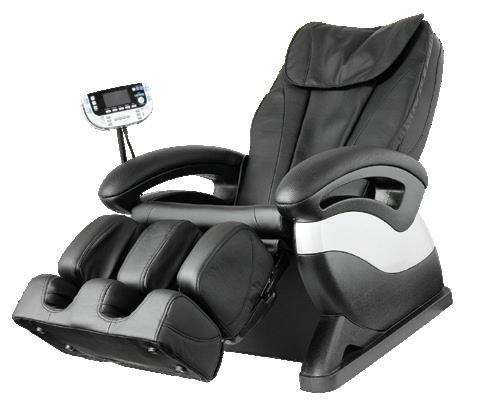
I will always remember my first gig. I saw a rather obscure Finnish symphonic metal band called Nightwish in 2008. Though my taste in music has changed over the past 15 years, I will never forget the sights and sounds of that concert. I was so naive – when the singer told us we were the “best audience ever”, I genuinely believed it. I’ve been holding onto that moment ever since.

What’s your guilty pleasure?
Chocolate cake. If a restaurant has a dessert menu that doesn’t involve chocolate cake, can it really call itself a restaurant?

What’s something new happening in your life right now? My daughter will be starting school next year, so my wife and I are trying to travel as much as possible in off-peak times. This has resulted in me dragging them around historical sites in foreign countries and my daughter snoring very loudly. I don’t think she’s particularly interested in ‘rocks’.
EXPOSED! - KRISTIAN DANIELSON
50 WORKPLACE360 - JUNE 2024
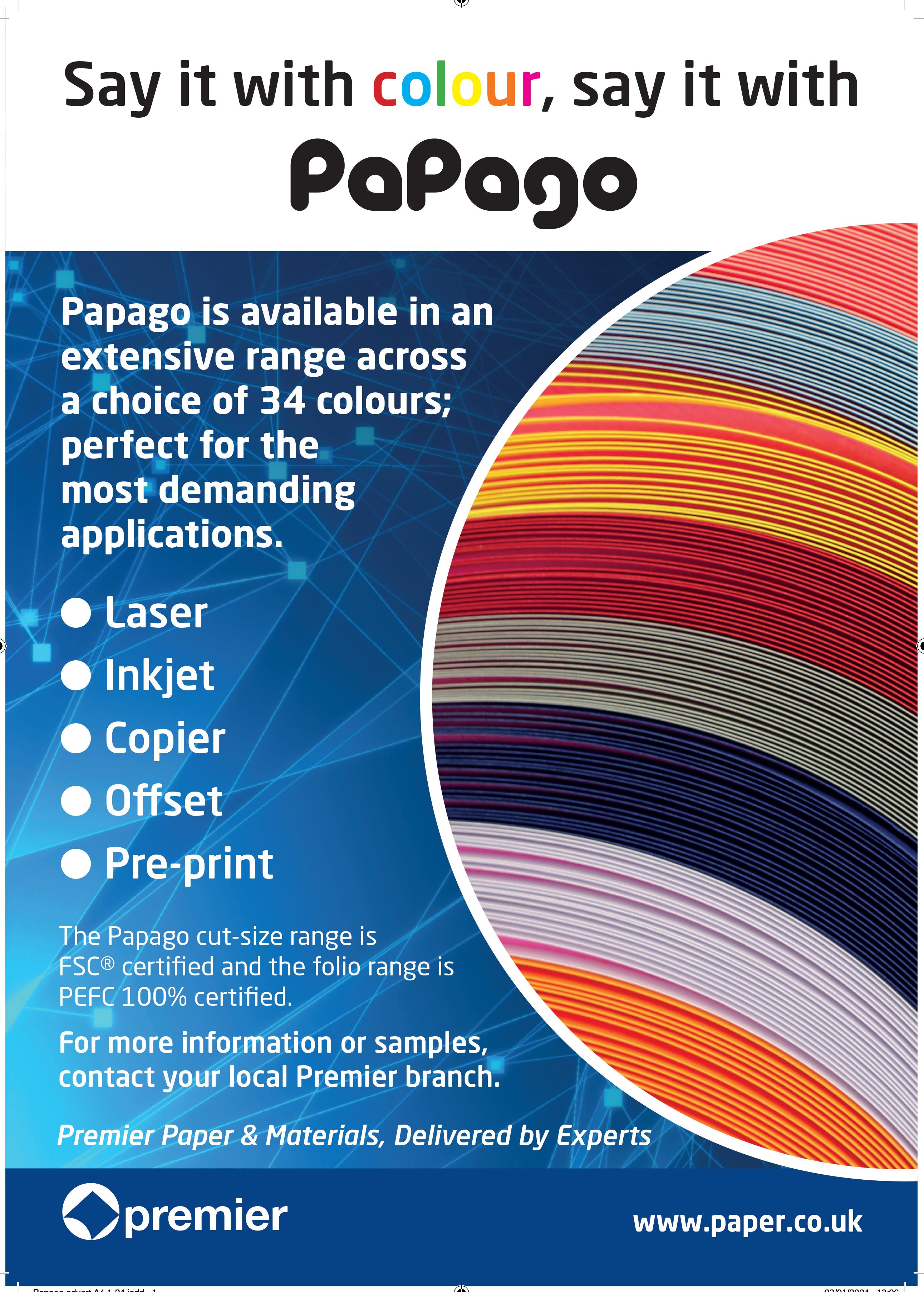
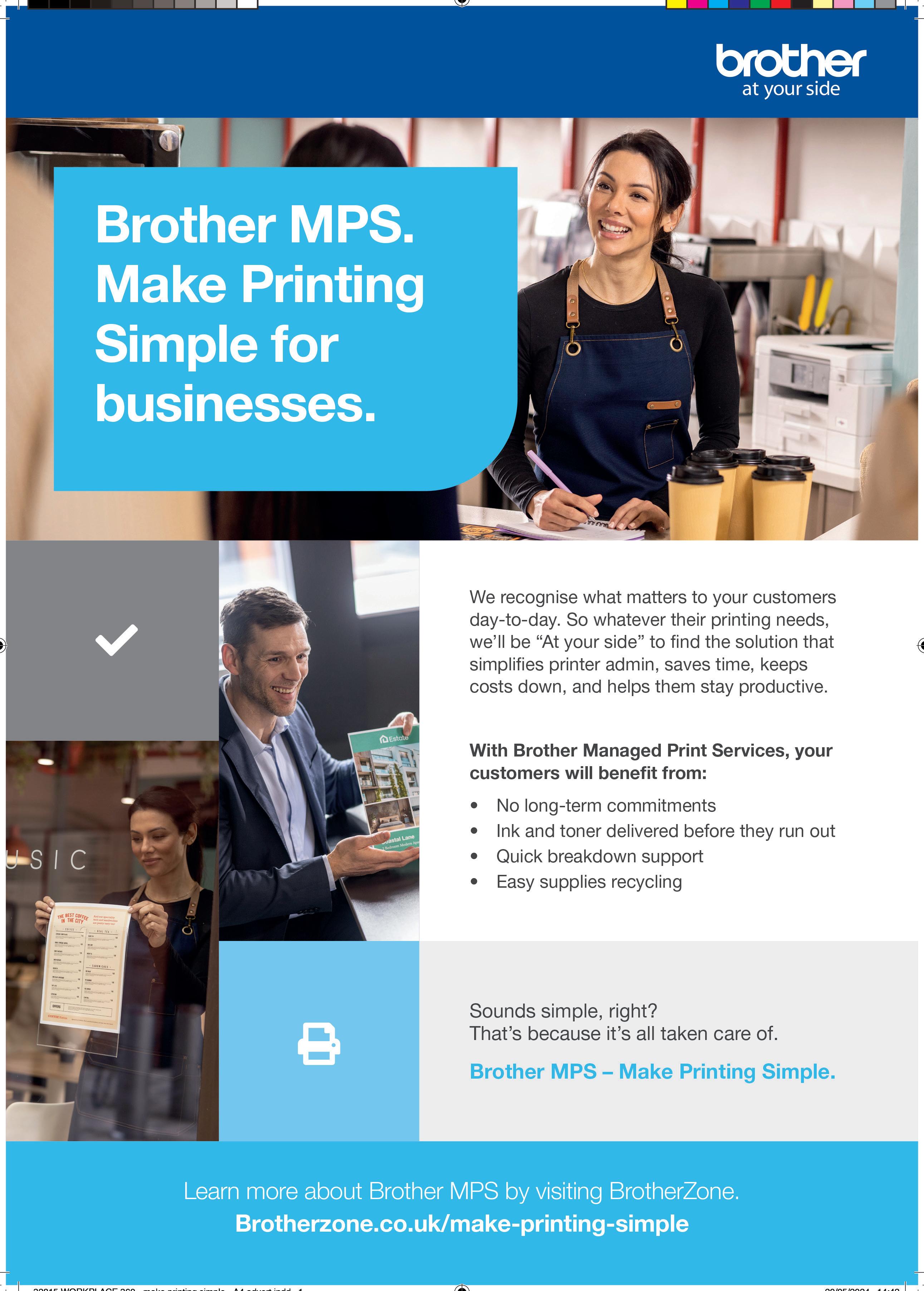

















































 James Stacey is FusionPlus Solution Consultant at ECI Software Solutions
James Stacey is FusionPlus Solution Consultant at ECI Software Solutions









































 Vicky Dymoke is Chief Marketing Officer at Meno Plan
Vicky Dymoke is Chief Marketing Officer at Meno Plan













